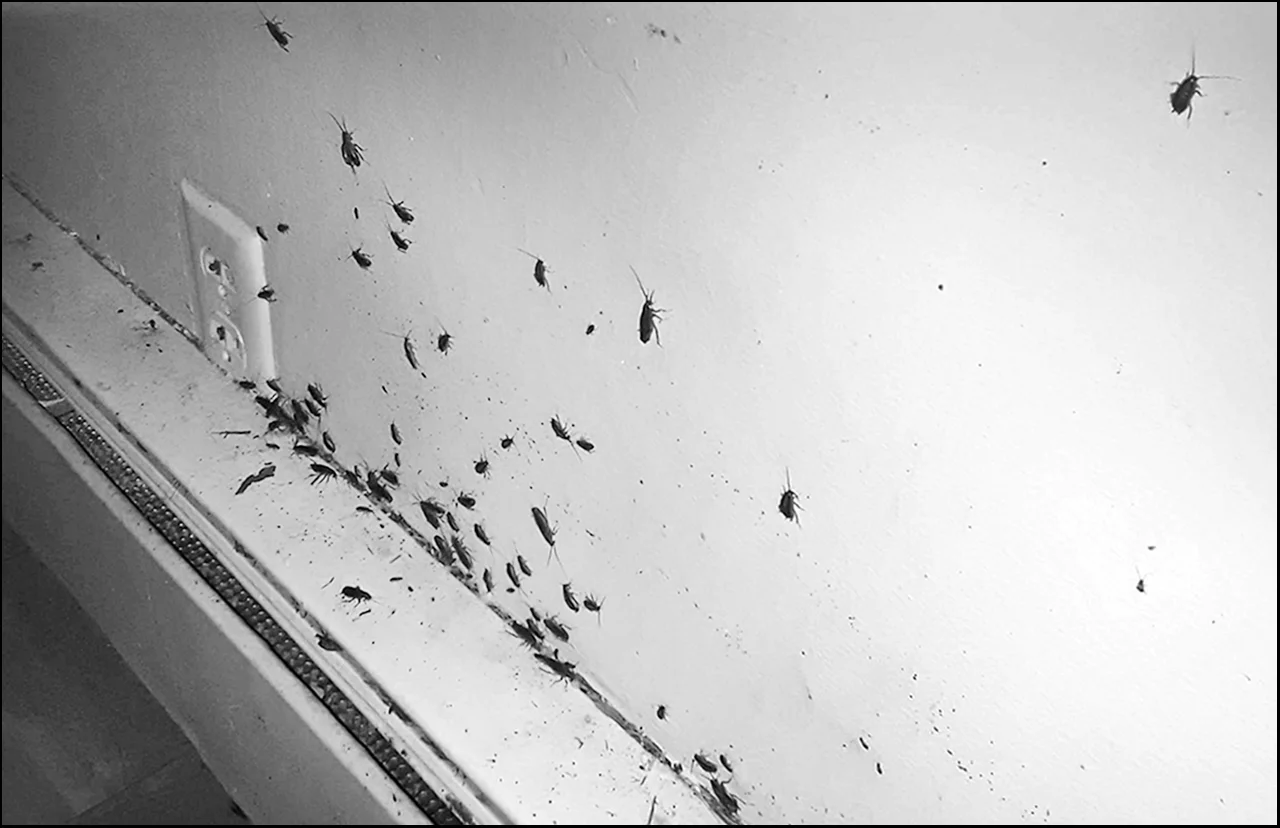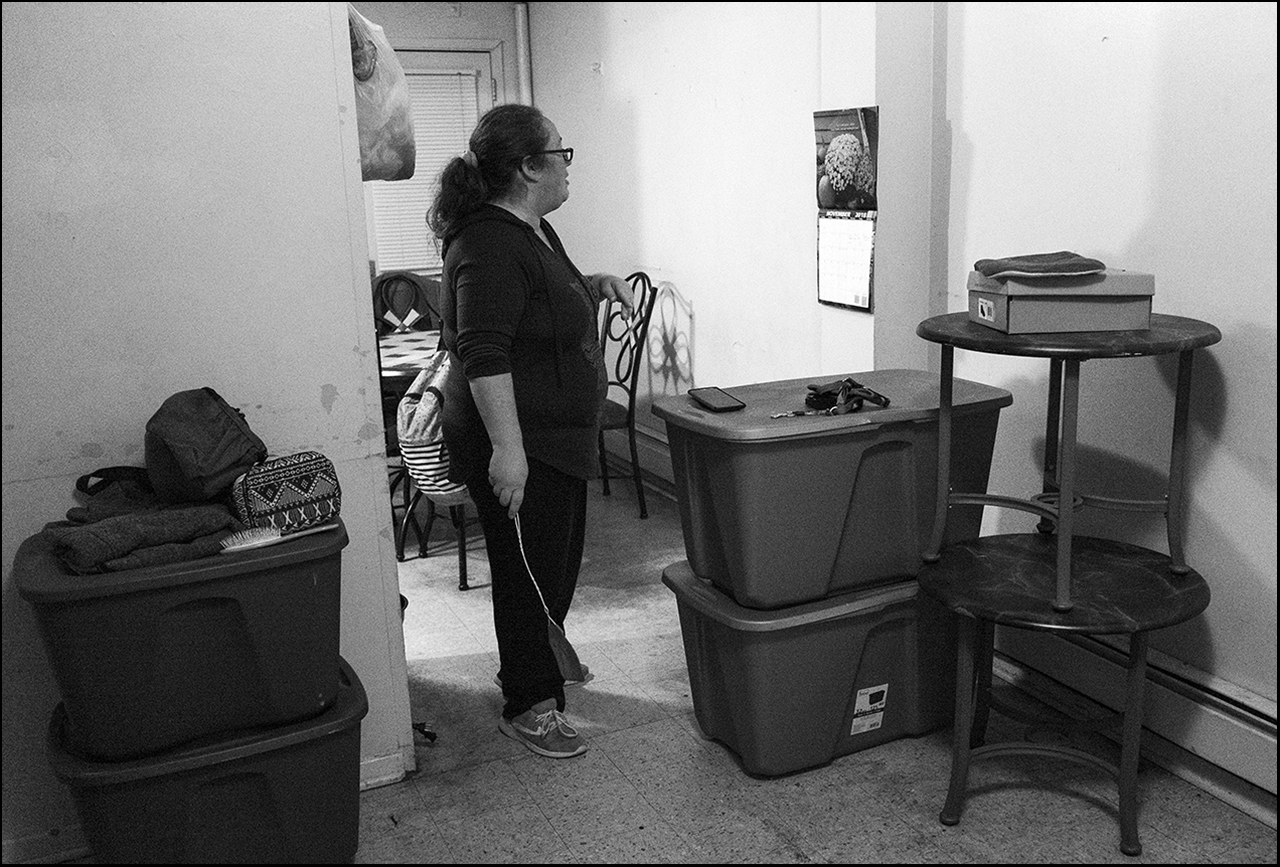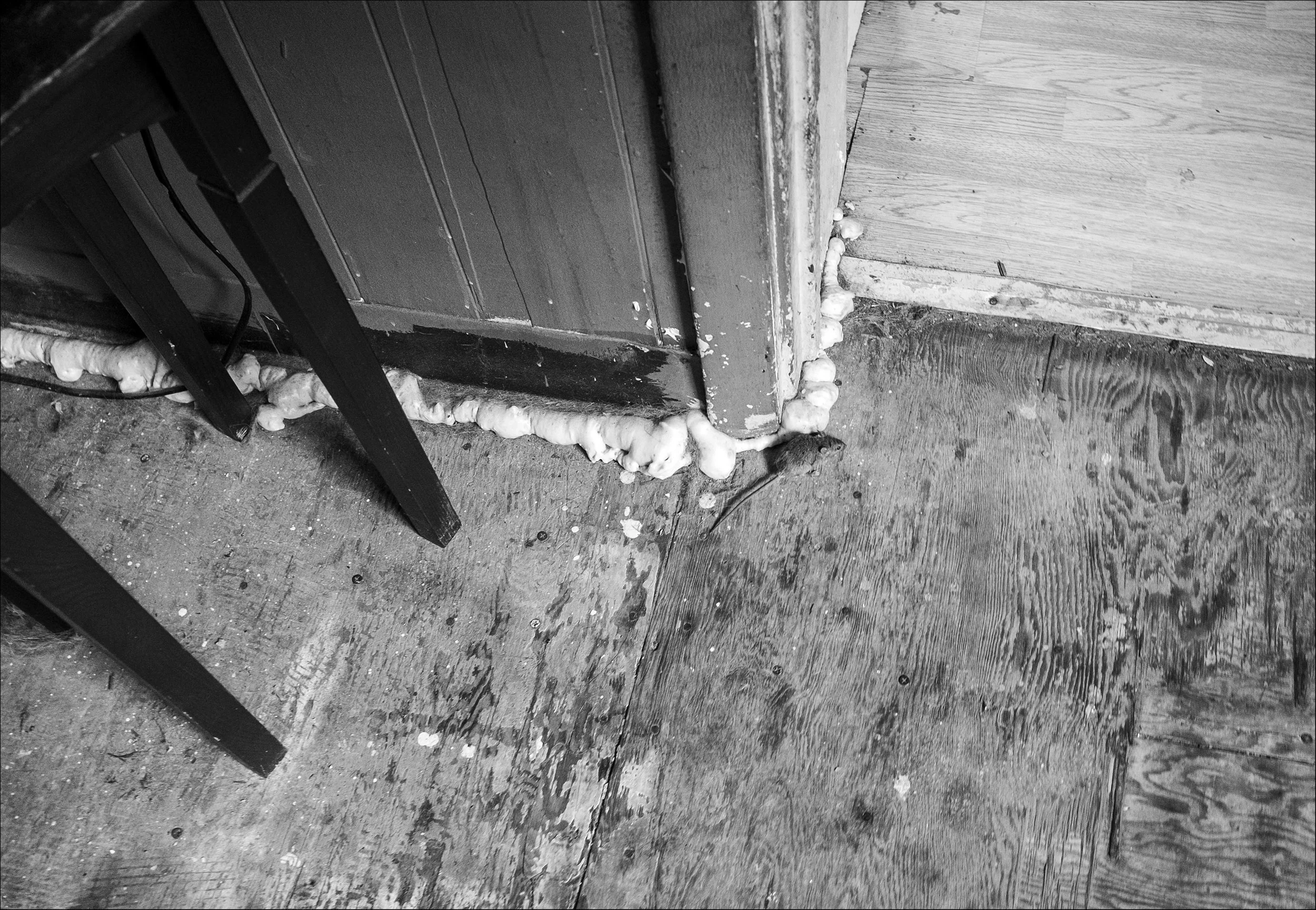In December 2017, Tom, (not his real name) and his wife moved into the Indian Hills low-income apartment complex in Quincy, Illinois. He says by spring, as the warm weather approached, they noticed an increasing number of cockroaches. Since then, Tom says although he has complained several times over the past year and a half he has lived there, nothing has changed.
“Once the winter was gone after us moving there, the roaches started appearing almost instantly, as soon as the cold subsided. Every single part of the house, they infested everything. Nothing's being done about it, which is a main concern for me because I have children there. I have a baby on the way, a baby daughter. Raising them in that kind of environment just isn't sanitary, and it isn't safe,” Tom said. “In my apartment alone, roaches will get into anything and everything, all of your electronic devices, anything, your decorations, your home décor, your furniture, your pillows, anything and everything they will infest.” Tom shows me the microwave in the kitchen where dead and live cockroaches are piled up behind the digital clock panel. “I had to throw my toaster away because it was filled with roaches. I went to make toast and looked down into the bottom of the toaster shafts, the bottom of the toaster was literally infested with roaches, moving with roaches. I turned it on and the smell of burning cockroaches filled the entire apartment within two to three minutes, and it was bad. They've infested my washer and dryer. They've gotten into the frame of my television.” The following video includes the voice of “Tom” as he describes the how he and his family live in his public housing apartment.
Tom says the cockroaches are present where he and his wife sleep in their bed. “I can hear them hissing and crawling around on everything. Honestly, I keep something on the phone playing during the night just so I can't hear the roaches and the titter tatter of all of them, hundreds of them. There's nowhere I can really run either because all of those roaches are literally destroying everything in my apartment and there's nothing I can do about it. Can't go to housing because they'll just give me the same excuse they've always given me. Then if I do it myself, I get evicted. If I try to bomb my apartment without their permission or without using their supplies, we'll get evicted.”
Tom adds, “From my point of view, people who live out in housing are out there for a reason. They're not out there because they want to be. They're out there generally because they have to be. I mean we're already on the fringe of what society has to offer already anyway getting by with just what we can. To have this aggravation added, destroying all of our property, endangering the welfare of our living atmosphere, it's ridiculous. It's ridiculous. Not only that, I am definitely not the only one out there at this housing complex with children to worry about with my own family and affairs to worry about without having to worry about if I'm gonna get a mouthful of roaches when I take a sip out of a glass in my own house. It’s an outrage. Especially when the children, the diseases that are carried in the fecal matter of cockroaches, the bacteria on the cockroaches themselves, and you have this crawling all over your cabinets, all over your food. If my food ain't in a package or if it's been opened longer than five minutes without me looking at it, I throw it in the trash, and I can't tell you how much food alone I've had to waste just because I know roaches are in it. I can see it through the package. I can see it in my drinks, my son's drinks, on my son's bottles, and he's just a baby. This is just milk we're talking about and they swarm to it. It's despicable.” “It's just sad. The housing here should be a place for you to go when you don't have anything else and not add more things to your currently hellish situation, and it does slowly but surely. If not slowly, it'll happen in swarms and it always does to everyone I've ever talked to out there at the complex, they're infested. I haven't seen one that isn't infested. I haven't been over to any apartment of anyone I've met out there and not seen a roach.”
Melanie lived in Quincy’s Indian Hills low-income apartment complex for about 11 years. She says her complaints about broken appliances, black mold, a cockroach infestation, and excessive peeling paint went unanswered for years.
While she always paid her rent, there were several occasions when she was late and she received a warning letter in August 2018. She then went to Jerry Gille, Executive Director of the Quincy Housing Authority, and complained about the cockroach infestation in her apartment. Gille says he remembers the conversation, but didn’t personally look into the apartment. When she was late with her rent in September and October, she was served with an eviction notice. By November, Melanie found another apartment and was ordered to pay about $800 in attorney and court fees. Gille said the eviction was a rent issue, but “based on everything I’ve learned, (since Melanie’s eviction) she had legitimate complaints.” Gille said at one point he planned to offer to stop the eviction process, but Melanie had already found another place to live.
Foreground. A cockroach trap on the microwave near the stove is filled with dead roaches as Melanie prepares dinner for herself and her two children. A dozen cockroaches begin crawling from the stove as it heats up. Melanie says she has to re-clean her washed and put away dishes and eating utensils, before using them each time, because there no place to store the items to keep the roaches off of them.
Melanie describes what it’s been like to live in her apartment. “They're (cockroaches) in all the doorjambs. They are smashed. They're smashed inside the seal of my refrigerator, and it's really hard to fall asleep at night and to get a good night's sleep, because oftentimes, you'll wake up and there will be a roach crawling across your arm or your leg, and hopefully not your face, or you'll see them crawling down the wall next to your bed. You cannot bring any type of food or drink up into your bedrooms. It would just attract more of them, so the only thing that we ever take upstairs is bottled water, and it has to have a lid on it, so you can't even have a cup of water next to your bed if you wake up in the middle of the night.” “You're not allowed to live a normal life when you live like this, Melanie said. My kids can't have friends over. I don't invite company over. Even my parents, you know, they don't want to come over here, because they don't want to see me and my kids living like this. It's just very upsetting. It's costing me out of pocket, and even with that, I still can't keep it under control to the point where we're living normal lives.”
Like a monument to she and her children’s nightmare of living with a pest infestation at Indian Hills low-income apartments in Quincy, a dead cockroach rests inside the thermostat lens dial located in the living room of Melanie’s apartment.
As she finishes her thought, Melanie got up from her chair while eating dinner with her children to kill three cockroaches on the kitchen counter. “I have lived at 1517 S 5th St, in Quincy, Illinois, in the Indian Hills complex since June 19th of 2008. I live here with my two children. Over the last year, I would say, the problem with the cockroaches has become out of control. Every room in my house is infested with cockroaches. They're in my refrigerator. They are in every cabinet. I have to keep my food in totes, so that the cockroaches cannot get to them, and everything is in a sealed bag. It makes it hard to cook.”
A wall near the baseboard heater in her daughter’s room is literally crawling with cockroaches. There are so many roaches not even bright light deters them. They simply don’t scurry away, but boldly remain in place. “You’re not allowed to live a normal life like this. My kids can’t have friends come over. Even my parents, you know, they don’t want to come over here, because they don’t want to see me and my kids living like this,” Melanie said.
Looking around the kitchen, one can count a couple of dozen stationary cockroaches, as more scurry from place to place. The cockroaches are content to live in plain sight even in the daylight. “Along with the cockroaches, we have also had mice in our house. I currently buy two large cans of Raid from Wal-Mart, every paycheck, every two weeks, along with sticky traps for the mice and roaches. I buy four packs of those as well. Another really big issue in my apartment is that the paint on every wall, or in every room, is peeling. There's several layers of paint. It falls from the ceiling and off the walls. The bedrooms upstairs also have black mold that reoccurs every summer, due to the humidity. When you're in my kitchen, you cannot use the two back burners of my stove. They do not work, and I was told that as long as the front two work, that's adequate.” Some of the interior walls are crumbling, raising concerns about lead paint in the apartment.
With fly swatter in hand, Melanie kills more of what seems like an endless number of cockroaches. Melanie says she must keep all food items in the 4 large tubs pictured, in an effort to keep the cockroaches out.
Melanie continues to describe her living conditions at Indian Hills. “In the bathroom upstairs, the caulking has came off, and there's a crack in the tub, so whenever you take a bath, the water runs down into the laundry room. There's also an exposed heating element between the living room and the kitchen. It has been missing the cover for at least three years, and I've been told several times that they're coming to bring back a new one to replace, and they have yet to do so. With the black mold, I had reported it to the director of maintenance for housing, and her response was that her maintenance men charged $25 an hour to remove it, but I could also get some bleach and take care of it myself, which I did. There was a time over the summer that I had no hot water when I came home on a Friday from work. I called the on-call maintenance person and was told that as long as I have running water, that is all that is required of them, and that they would come take care of it on Monday. With the stove burners, that has been a problem for over two years, the exposed heating element, at least three years, and the last time that I had anything painted was one of the bedrooms seven years ago. Nothing has ever been repainted since then.”
Melanie says she reported the mold in her son’s bedroom to the director of maintenance and says the director’s response was to say she could have her maintenance men clean the mold for $25 an hour, or Melanie could do it herself with bleach and water. Melanie says the mold appears every summer because the apartment on the other side of the bedroom wall uses an air conditioner, which creates high humidity in her son’s adjacent bedroom. Melanie says despite asking on several occasions, the last time anything was painted in the apartment was one bedroom that was painted seven years ago. Large swaths of paint hang from the ceiling in her daughter’s bedroom.
The walls in Melanie’s son’s bedroom are covered in mold caused by high humidity created by the neighboring apartment’s window air-conditioning unit. Jerry Gille, Executive Director, Quincy Housing Authority, says “mold or mildew go hand in hand with peeling paint typically.” Gille says they have a hard time keeping paint on the walls, because there’s no ventilation system in the apartment units. “Running an air-conditioner condensates (on the walls). It degrades the paint, causing the paint to pop and peel. And it will cause mildew or mold to form. It happens all the time.”
A sticker on Melanie’s refrigerator indicates her apartment was sprayed for cockroaches just 6 days prior to the photographs made of the cockroach infestation in her apartment. “Big River Pest Control does come in. They are hired to spray,” Melanie says. “They're under contract to spray every 28 days. When I come home from work, there is a sticky note on my fridge every 28 days, but I'm not here to see what they do. I have noticed that once they do spray, it seems like the roaches get worse. The last time that they sprayed was on October 30th, and prior to that, they sprayed on October 2nd. They also did a full treatment, the UV treatment, on my apartment in September, that was supposed to kill all the roaches,” Melanie said.
The cockroach photographs for this story, according to this October 30th sticker left on Melanie’s fridge, were made just 6 days following a routine cockroach spraying at Indian Hills apartments. Melanie says cockroach spray is supposed to be applied every 28 days, but it does no good. Melanie says two months prior they did a full treatment. “They also did a full UV treatment on my apartment in September of 2018. That was supposed to kill all the roaches.”
According to the Centers for Disease Control and Prevention, cockroaches cause serious health problems. They provoke allergic reactions, including asthma, and it is suggested they carry multi-drug resistant pathogens like bacteria. “On several occasions in the last few months I have had conversations both in person and over the phone with Jerry Gille, (executive director of Quincy Housing Authority), in regards to the issue of cockroaches in my apartment. He would state that he was sympathetic. He also shared his frustration with the issue that so many apartments and even whole buildings were infested with roaches.” Melanie says back at the end of August 2018, she was told HUD inspectors were coming down and there would be a HUD inspector at the Quincy location in September, and they would look into everything. “The HUD inspector, to the best of my knowledge, never came to my house. I was home that day, and no one ever showed up.”
The cockroach infestation is so bad, they have made their way into Melanie’s refrigerator.
““We moved a disabled couple from one cottage here to another cottage over here. And it was a really bad ... That unit had gotten out of hand bad. And I got the pest control company owner down there. I said, “Look, man,” I said, “There’s only two apartments in this building. How is it that we have a bug problem,” I said. “Neither one of these people are bad housekeepers.” ”
Chipped paint in the kitchen above the cabinets hides dozens of cockroaches, which creep in and out, both there and in several other areas of the apartment.
The paint on the living room window sill chips easily, as rust and corrosion stain the walls. Melanie says, it’s impossible to clean the walls because the paint just peels off. There are several crumbling interior walls in the apartment, which adds to the unattractive living environment.
According to Melanie, on October 31st, 2018, the Quincy Housing Authority filed paperwork to start an eviction process. “I was served it on November the 5th, 2019, on a Monday morning, at my place of employment, by the housing officer. I was called out from my desk by my boss and told that there was a police officer there to speak with me, who then, in front of my coworkers, let me know that I was being evicted from my place to live. It was very upsetting to me. It was very upsetting to have to later on tell my children that we have to find a different place to live, and my court date is on November the 8th at 2:00 PM, so I have three days in which to prepare a case to find myself somewhere to live.” Melanie says she feels the management is dismissive of legitimate complaints, and tend to blame the tenants for the cockroach issues. ”I just want to add that living in public housing, it's supposed to be a place that's safe. You're supposed to have rights as a tenant, and you're supposed to have staff that respects you. I have been told repeatedly that I live in a filthy manner, and that's why I have bugs, by the director of maintenance. She has told me that every time she comes in to inspect my house, my house is just filthy dirty, and that I need to learn how to clean a house better, and then I wouldn't have bugs. I don't feel like I live in a filthy ... You know, I don't feel like I live in filth, but it's also really hard to wash walls when the paint peels off of them, you know? And I feel like HUD should be held responsible to do more than a once a year check.” When looking around Melanie’s apartment, one sees the four large sealed tubs she keeps her food in, and the apartment looks reasonably clean. She limits all food to the kitchen area only.
Melanie speaks with her son for a moment regarding school. Large sections of paint are chipping and peeling throughout the entire apartment, which creates hiding places for cockroaches.
Gille says there are a number of factors contributing to the cockroach problem at Indian Hills including some cases of poor house-keeping, however, “I don’t believe Indian Hills tenants are inherently bad at keeping a clean apartment,” he said. We moved a disabled couple from one cottage here to another cottage over here. And it was a really bad ... That unit had gotten out of hand bad. And I got the pest control company owner down there. I said, "Look, man," I said, "There's only two apartments in this building. How is it that we have a bug problem," I said. "Neither one of these people are bad housekeepers." The larger issue is the way the buildings are laid out. “The reason why I think it’s so difficult in the line of work we do is because of the way the buildings are laid out. I think it’s that simple. You’ve got raceways….You’ve got raceways and waterlines that go from building to building.” Gille points to a building. “This particular building has 10 units, so if you go in and just light up a unit, what do they (cockroaches) do? They scatter. They go to the adjoining apartments. And they eventually filter back in. Pest control up to this point has been hesitant to treat an entire building at a time because of the difficulties involved in prepping an entire building at once.” Gille says four weeks ago they actually started with one building, but it’s too early to tell if it is going be effective.
Live and previously smashed cockroaches greet those who walk into any of the bedrooms. Cockroaches are smashed each time one opens and closes an interior door. The dead roaches accumulate within minutes.
Melanie says. “I just really want to see a change, even if me and my kids aren't going to live here, for anybody who lives out here after us. I'm going to have to go from paying what averages about $500 to $550 a month for my rent and utilities to the options out there that I've looked at for a three bedroom, two ... or, I'm sorry, for a three bedroom home. It ranges anywhere from $600 to $800 a month, and in addition to that, I'm going to have to pay utilities, so that's $1,000 a month. That's like double what I'm used to paying, and I don't know how I'm going to come up with it. I'm a single mom with two kids, that can't afford $1,000 a month.”
After being evicted from her Indian Hills low-income apartment on November 29, 2018, Melanie finishes up cleaning on her last move-out day. She managed to find a small house to rent. Melanie says she and her children’s lives feel normal now that they have a clean and pest-free environment to call home.
Jerry Gille says if he had a magic wand, or one wish, it would be to eliminate the pest problem. “I don’t want people living in these conditions any more than people want to live in those conditions. I’m telling you that there’s not a day that goes by that I don’t worry about this problem and try to figure out something else to do with this problem. And I haven’t been overly successful at this point.”
Editor’s Note: Three additional individuals living in Indian Hills apartments were interviewed. They also shared stories of cockroach infestations in their apartments. There are no simple or immediate answers to this problem. But it IS a problem. We're bringing awareness to the situation in hopes that something can be done to correct the issue. People shouldn't have to live in conditions like this. While some have suggested the reason for the infestation is because people are dirty, inspections are regularly done to maintain clean living environments in each apartment. (And, being a bad housekeeper transcends ALL income levels.) The quality of housekeeping isn’t the main reason there is a problem. Even the Quincy Housing Authority director has acknowledged the issue stems from a much larger problem.
As always, the Quincy Illinois Poverty Project appreciates the public’s concern and we hope to generate enough awareness to help the director and his staff find appropriate avenues to stop this.
Greg says he and his wife are subjected to mold and other major health-harmful issues in the apartment they rent on the north side of town. He says despite paying $500 a month rent, there are issues he has asked the landlord to repair for more than two years with no results. He says his landlord simply ignores him. The following are photographs illustrating their living conditions.
February 2019: In broad daylight, a mouse scurries across the rough plywood floor of the apartment. With exception of the kitchen floor, the entire flooring is exposed. Greg says the landlord said he would replace the carpeting 2 years ago, but never did. “I’m paying $500 a month for this, but can’t even walk around barefooted or with socks on, because of splinters,” Greg said.
February 2019: The lighting fixture in the kitchen shows signs of faulty, burned wiring. Substandard housing is one of the major causes of house and apartment fires in Quincy.
February 2019: The kitchen sink is literally separated from the countertop contributing to the number of rodents in the apartment.
February 2019: The flooring under the kitchen sink is completely rotted, making way for rodents to enter the home freely.
February 2019: Mold, mildew and water stains remain on the ceiling tiles from a leak in the bathroom above.
A PROACTIVE rental occupancy health and safety inspection PROGRAM is desperately needed in Quincy, Illinois TO ADDRESS substandard housing and the victimization of women, children and the elderly.
Hundreds of communities in Illinois have such inspection ordinances in place, yet our city doesn't. This page contains the ongoing results of interviews and photographs detailing how far too many of our neighbors are forced to live as they try to deal with landlords who’s properties are falling apart, pest infested, and dangerous to live in.
The following examples are only a snapshot of a greater problem. Please contact us by email if you are interested in joining us in promoting a city ordinance to address demeaning and dangerous living conditions in our "GEM" city.
We are adding properties to this page as we find them. If you have any knowledge of anyone struggling with similar conditions, or would like to support an inspection ordinance, please contact us at quincyilpovertyproject@gmail.com
June 2018: Dennis displays a rat he says he caught in his Quincy, apartment. "I was sitting on my bed watching TV when I saw one come out, and then another. When I turned on the lights, I counted at least seven of them." Dennis says he keeps dry foods in his refrigerator to keep the rats out of it, but they found a way to get in there too. Other tenants of the building shared similar stories. "I'm afraid to report this to the health department, because they might condemn the apartment and I'll have no place to go," Dennis said. Using the disability income he began receiving earlier this year, within a few weeks, Dennis manages to find a different place to live.
August 2018: With a box fan nearby to keep cool, a three-month-old infant sleeps in her playpen. Not one outlet in the rental is able to handle the electrical load of even a small air-conditioner window unit. With no central air, or window unit, temperatures in the apartment reach 98 degrees. The tenat said landlord refused to install a dedicated electrical line to handle a window unit, because he didn’t want to spend the money for it. Meanwhile the family of 7 suffer through the high temperatures. The rest of the apartment has more problems including leaking water lines, which have caused months of water bills exceeding $230 per month, the tenant says. With no resources to find another place to rent, the family makes due living in a dangerous substandard dwelling.
ADVANTAGES OF PROACTIVE RENTAL INSPECTION (PRI) PROGRAMS
In many instances, PRI programs may be more effective than complaint-based programsin ensuring safe and healthy housing, preserving housing stock, protecting vulnerable tenants, and maintaining neighborhood property values.
PRI Programs Preserve Safe and Healthy Rental Housing
By relieving tenants of the burden of having to force reticent landlords to make needed repairs, systematic inspections can help ensure that a locality’s rental housing stock is maintained and that residents live in healthy conditions. Between the establishment of Los Angeles’s Systematic Code Enforcement Program (SCEP) in 1998 and 2005, “more than 90 percent of the city’s multifamily housing stock [was] inspected and more than one and half million habitability violations [were] corrected. The result [was] an estimated $1.3 billion re-investment by owners in the city’s existing housing stock.”
For example, between 2008 and 2013, under Sacramento’s Rental Housing Inspection Program, housing and dangerous building cases were reduced by 22 percent. According to a study of PRI programs in five North Carolina cities, the City of Greensboro alone brought more than 8,700 rental properties up to minimum standards in four yearsunder its proactive rental inspection program (RUCO). In addition, by ensuring that landlords are aware of poor conditions before they worsen, systematic code enforcement encourages preventative maintenance, which is more cost effective than deferred maintenance, and thereby helps landlords to maintain their properties.
Here's more information about proactive rental inspection programs, including advantages and challenges, provided by Maggie Strong with “Quincy Next.” (click on the link):
A Guide to Proactive Rental Inspection Programs
PRI Programs Help Protect the Most Vulnerable Tenants
Often, the most vulnerable tenants don’t complain. Some tenants are unaware that they have a right to safe and habitable housing. They may not know about existing tenant protections or code enforcement programs. Or they may have language barriers or disabilities that make it difficult to navigate the code enforcement system. Many tenants may be afraid to complain about their housing for fear of increased rent or landlord retaliation (such as eviction). Residents may be undocumented or have limited income that hampers their ability to move.
As a result of these barriers, the housing inhabited by the most vulnerable populations, which is frequently the worst housing, is often the most likely to fall through the cracks of a complaint-based code enforcement system. In 2009, Linda Argo, the Director of the Department of Consumer and Regulatory Affairs (DCRA) for the District of Columbia, testified before D.C. City Council about the need for their proactive rental inspection program. She explained, “it's quite clear that a complaint-based system is no longer sufficient if we want to maintain safe housing conditions for all residents, especially our most vulnerable – the poor, the elderly, the non-English speakers.” She noted that “[f]or the vast majority of properties named in the slumlord lawsuits [initiated by the Attorney General], DCRA had not received any recent complaints from residents of those buildings. And for the worst of the properties, we never received a single complaint.”
PRI Programs May Preserve Neighborhood Property Values (and a Locality’s Property Tax Base)
One of the lessons localities have drawn from the foreclosure crisis is that it is crucial to prevent concentration of blighted properties, in part because poorly maintained, substandard housing can have a negative effect on neighboring property values. By addressing housing conditions proactively, and by quickly identifying and targeting exterior substandard conditions alongside interior code violations, proactive rental inspection programs can ensure that properties don’t become blighted, thereby preserving property values. From a financial standpoint, this benefits landlords and homeowners. Maintaining neighborhood property values also benefits the entire locality because it preserves the local tax base.
Quincy Fire Department Deputy Chief of Operations Supports A Proactive Rental Inspection Program
““One thing we do have in Quincy, from time to time, we do have fatal fires and usually they occur in older parts of the neighborhoods, the older housing. A lot of times they have been in rental properties.” Dreyer says if we had a proactive rental occupancy inspection, “maybe we could help prevent people from dying inside of fires.” ”
October 2018: “One of the best things we can do to put out a fire is prevent it from starting,” says deputy chief of operations, Quincy Fire Department, Greg Dreyer. “One thing we do have in Quincy, from time to time, we do have fatal fires and usually they occur in older part of the neighborhoods, the older housing. A lot of times they have been in rental properties.” Dreyer says if we had a proactive rental occupancy inspection, “maybe we could help prevent people from dying inside of fires.”
Dreyer says a proactive rental occupancy inspection program would help catch a lot of problems early on. “Part of the proactive part of that would be an inspection where we’d catch things like electrical, gas leaks, and all the things that can be found and fixed before they turn into a fire.” Dreyer says a lot of the fire calls they go on are in the older parts of town, especially old buildings where electrical services and equipment on the sides of the buildings haven’t been updated. “Electrical is a big thing, sometimes we have problems with the old circuits. The new air conditioners, space heaters and things like that can’t keep up.”
“One thing we do have in Quincy, from time to time, we do have fatal fires and usually they occur in older part of the neighborhoods, the older housing. A lot of times they have been in rental properties.” Dreyer says if we had a proactive rental occupancy inspection, “maybe we could help prevent people from dying inside of fires.”
Dreyer adds, “No matter what kind of condition you're living in out there, there's things you can do to help hopefully, so if a problem starts, that you can get out of your house. Smoke detectors, CO detectors are also very important. The other thing I might recommend is the National Fire Protection Association, NFPA, has a home inspection checklist on their website you can go to. It walks you through your house and talks about things like if you're using a space heater, how far to keep combustibles away from it. It just talks about a little bit of everything. It's a little bit of a checklist that you can walk through your house and make your house safer.”
“Currently in the city of Quincy, with the Red Cross, we come out and install free smoke detectors inside of people's homes for them. All you have to do is call the Red Cross or call the Quincy Fire Department. We'll come out and get those detectors installed. Second thing, if we get a smoke detector in the house, the second thing you should have, if you have gas appliances in your house, you should have working CO detectors, because CO is an odorless gas.” “If you have a furnace malfunction, or a hot water heater malfunction, a CO detector can save your life.”
Yvette says she has complained to her various landlords for years about issues with her apartment, to no avail.
Pastor Tony Metz has a few words to say about poverty and homelessness in Quincy.
Video: Tony Metz, Pastor of Luther Memorial Church in Quincy, speaks about the proposed city rental occupancy minimum health and safety standards inspection program designed to protect vulnerable victims and combat neighborhood blight. The horrific living conditions I’ve seen in Quincy, during the past 2 years is widespread and detrimental to basic human dignity. Our director of city planning and development wrote an ordinance draft last year to combat the problem, but there isn’t enough support from the city council to bring it to the table. Please join us in supporting change. For more information, please send your contact information to: quincyilpovertyproject@gmail.com Visit the website at quincyilpovertyproject.org Follow us on Facebook: #quincyilpovertyproject Thank you.
““I was looking at apartments a few years ago and went to look at one on Washington St between 5th and 6th in the alley. There was no room for a bathroom, it was a make shift toilet and sink in a corner of one room. There was insulation hanging down from the ceiling in the kitchen and crumbling plaster and laths. They wanted $500 a month for this.” ”
This renter, who is Afraid of retaliation from her landlord for speaking to the Quincy Illinois Poverty Project, works two jobs, roughly 16 hours a day, to make ends meet. She pays $775 a month in rent, which includes electric, trash, and water. She is a single parent raising two teenage children. She has lived in this dwelling for 18 months. She says her landlord promised the repairs would be made, but he hasn't done the repairs.
She says, after repeated attempts to get her landlord to do the promised work, she has given up on getting any results. The renter says she would move, but it's difficult to save enough money to provide a deposit and first and last month's rent on a different place.
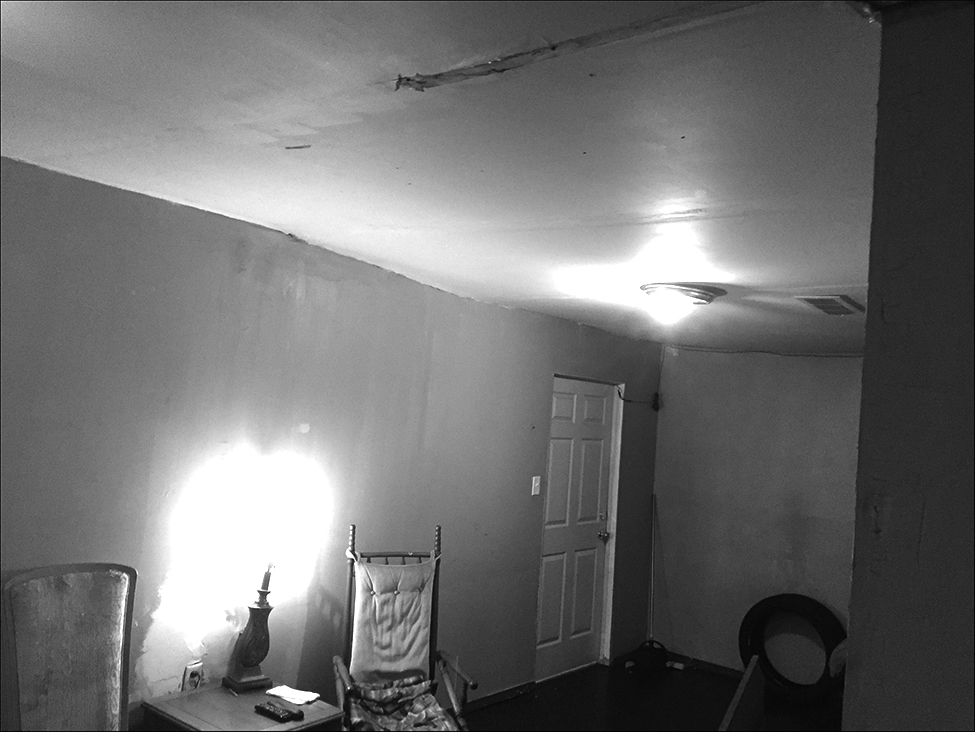
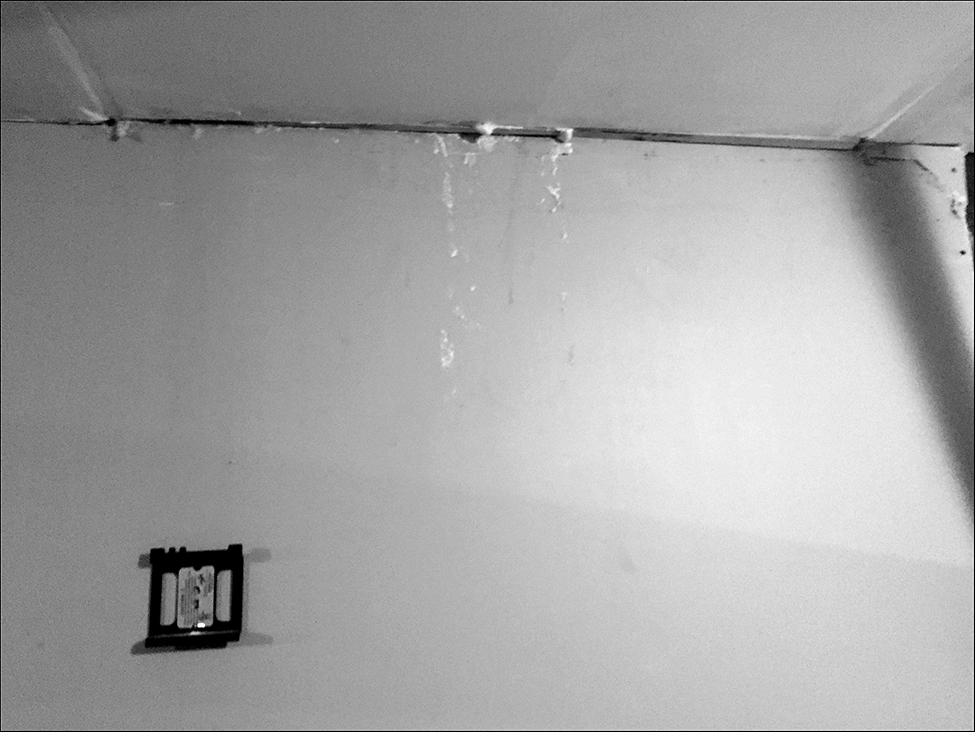
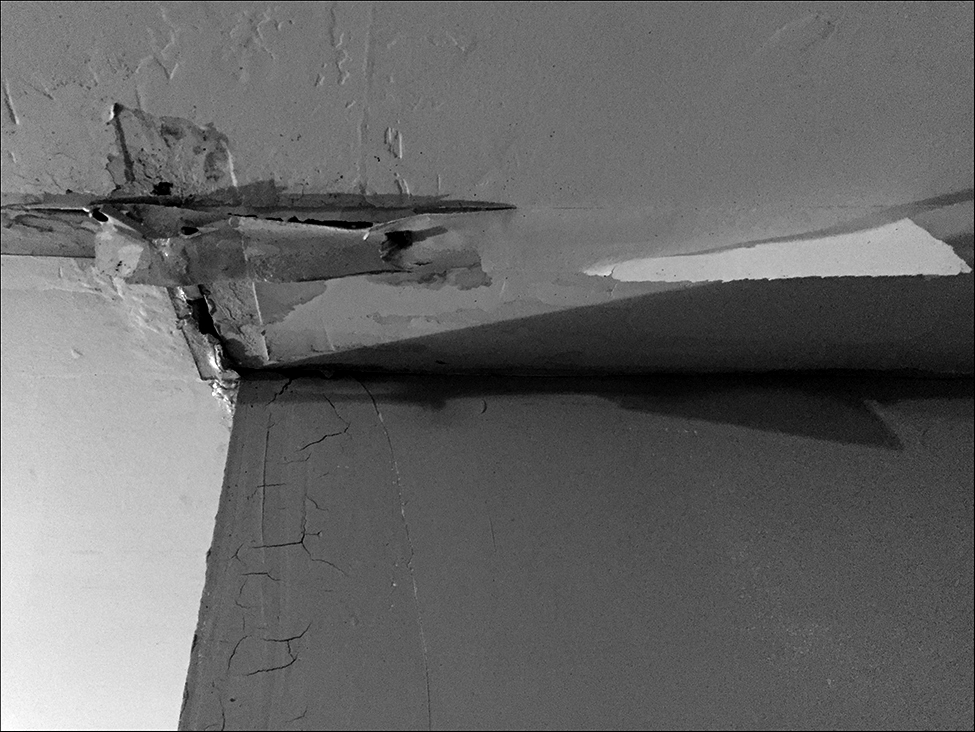
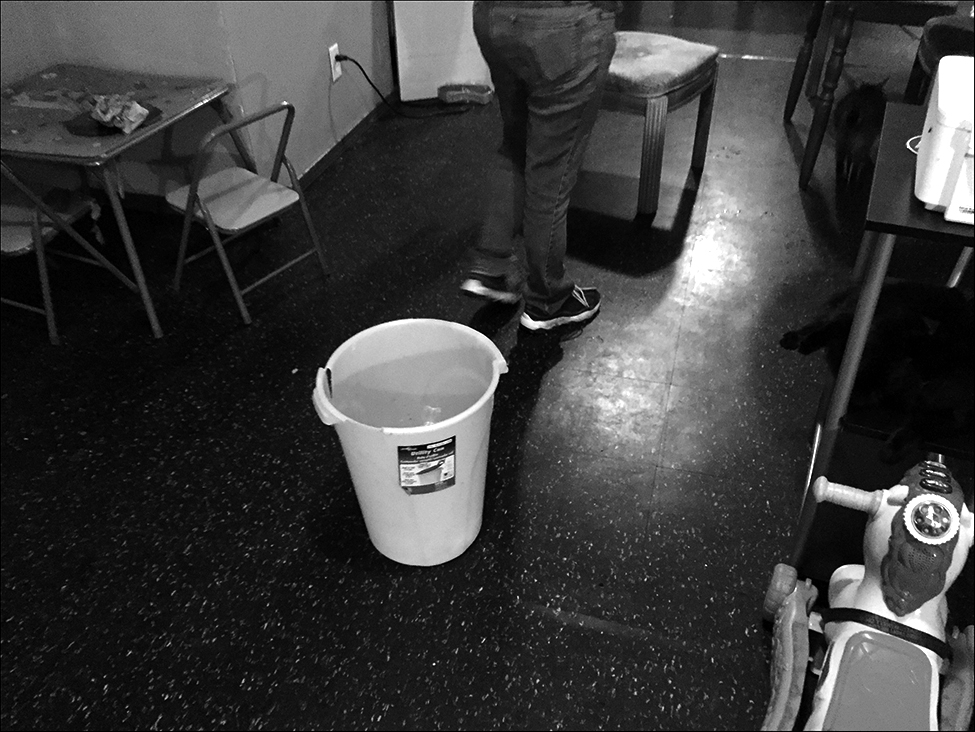
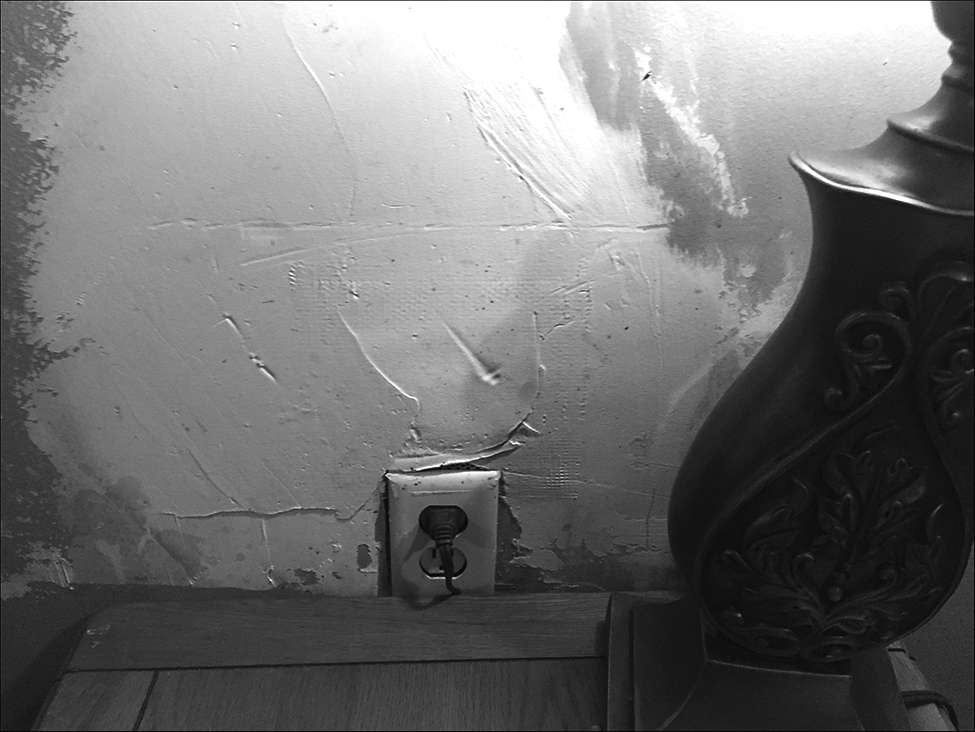
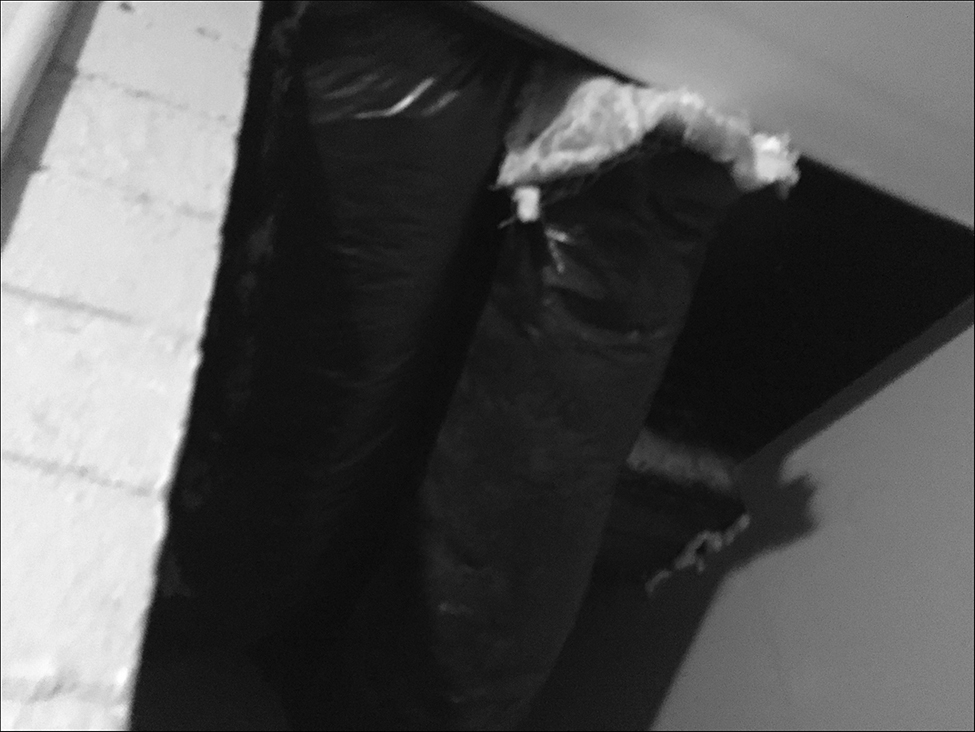
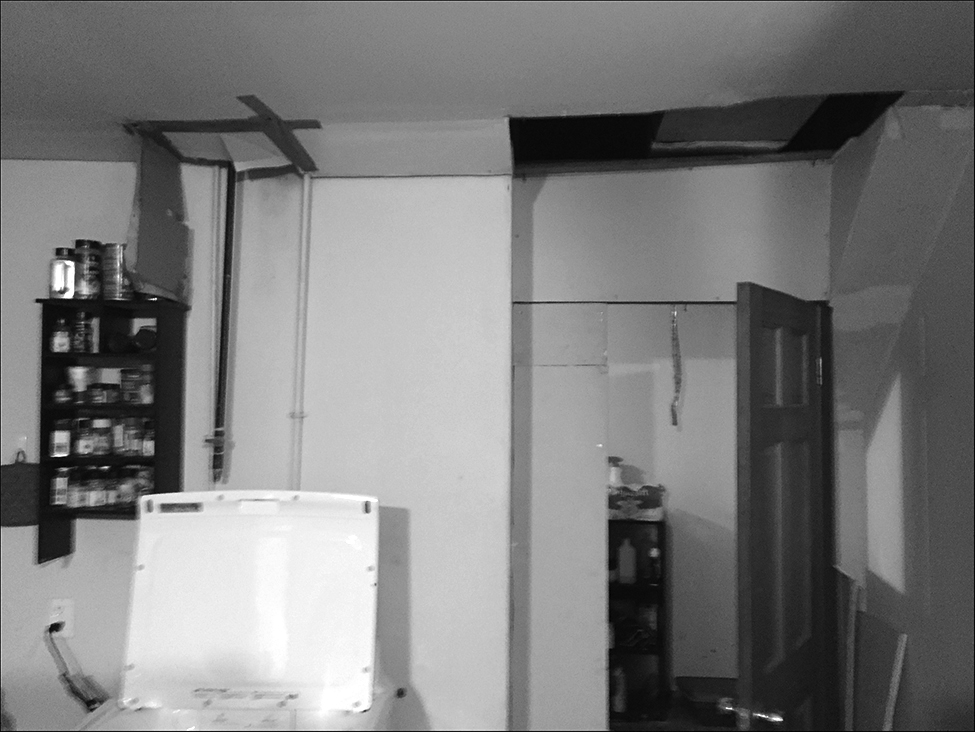
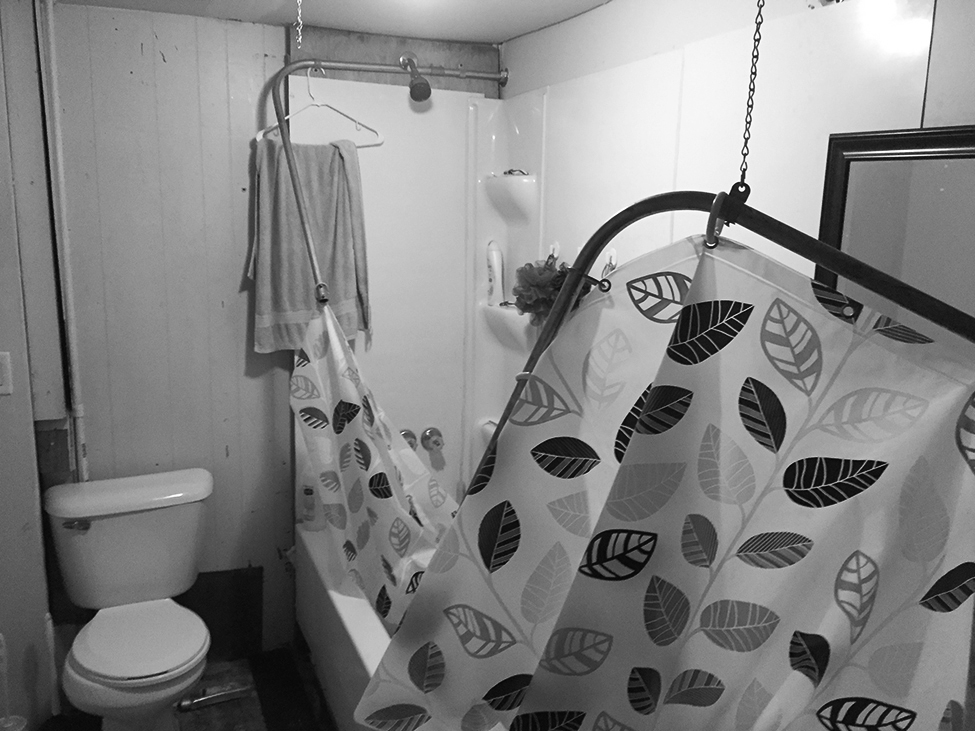
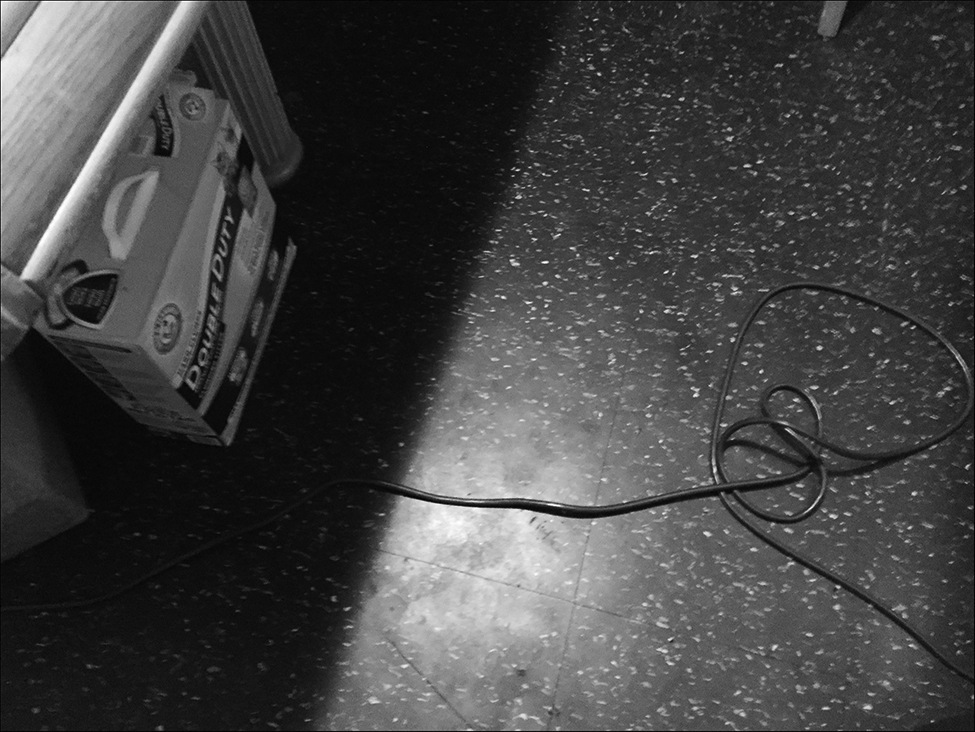
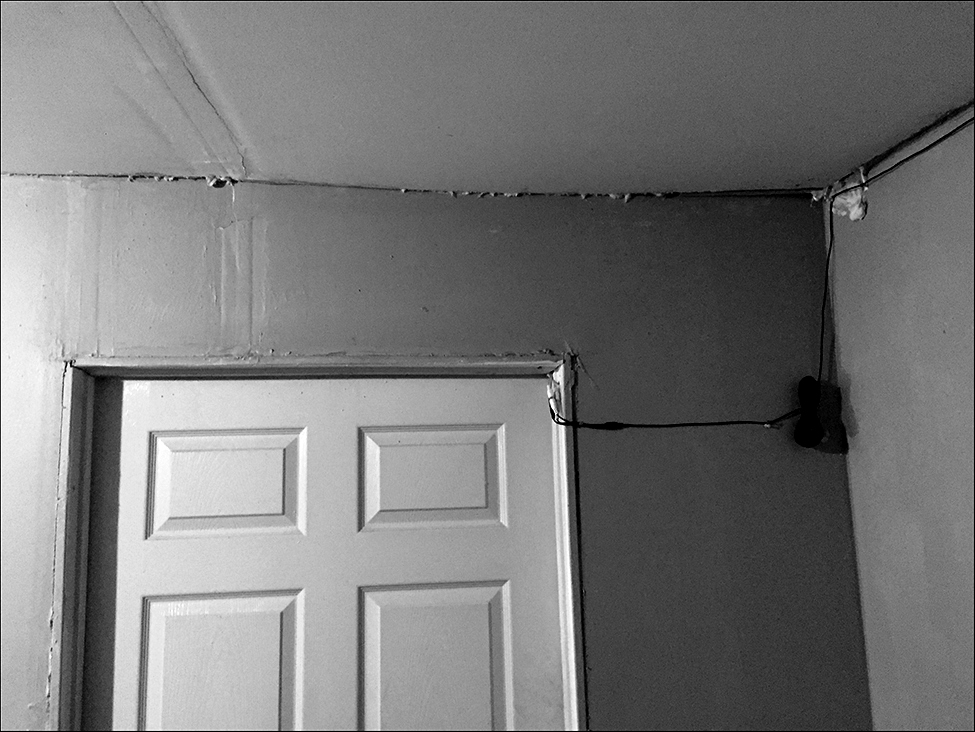
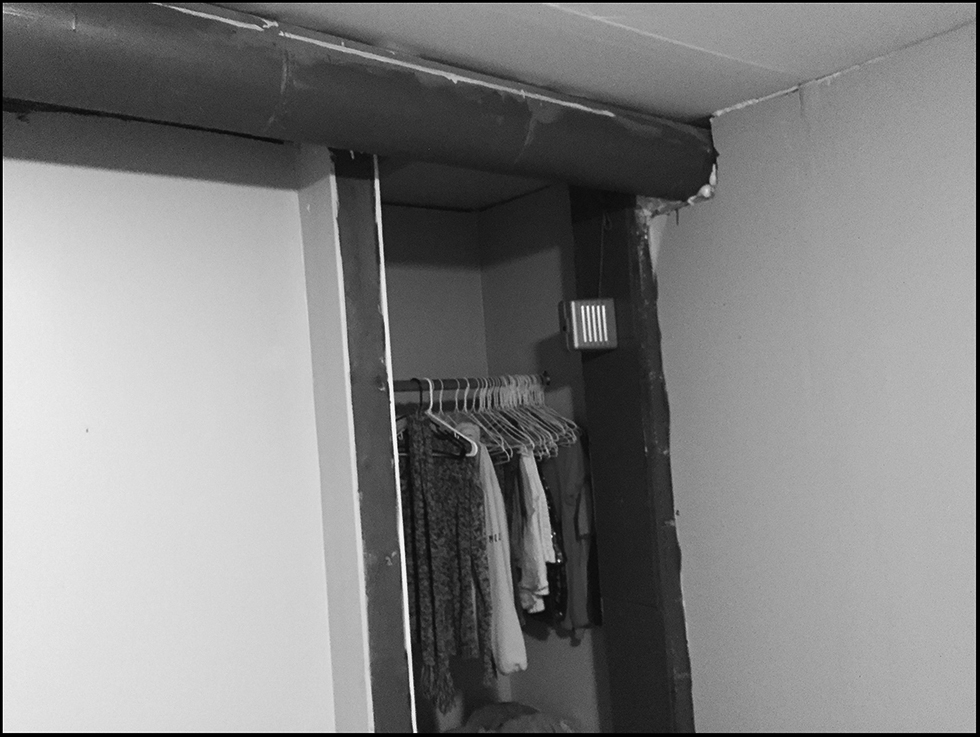
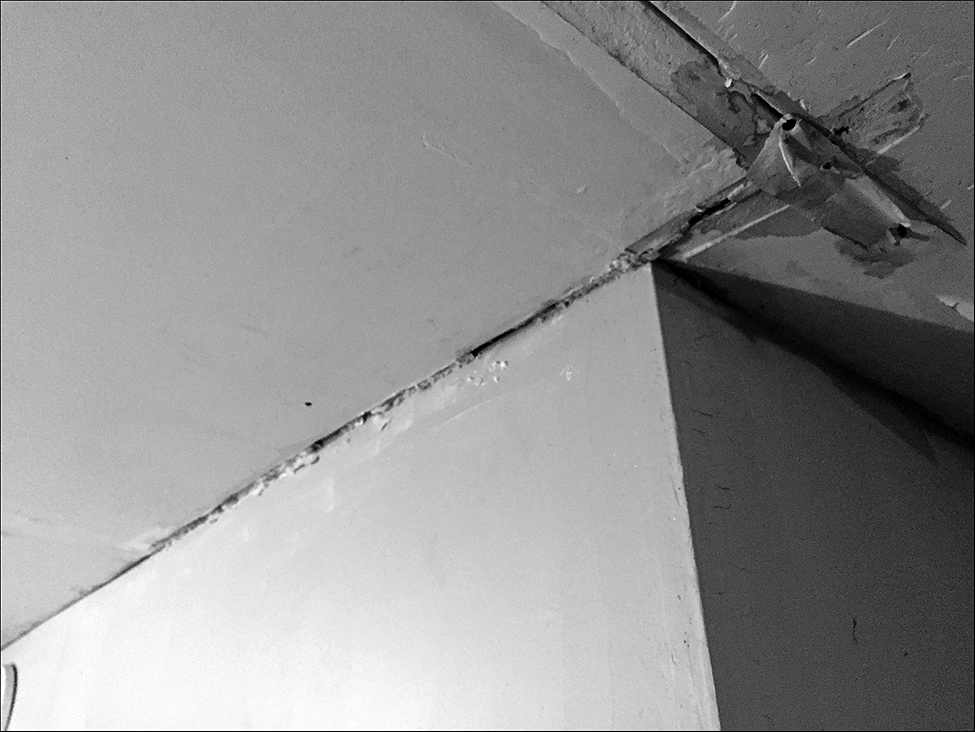
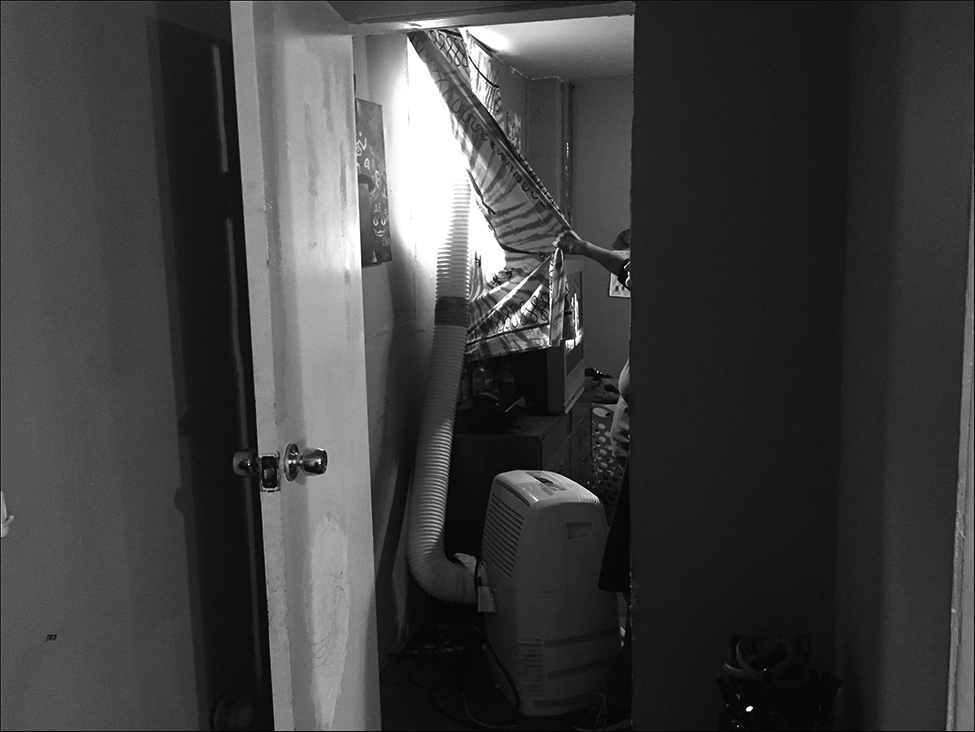
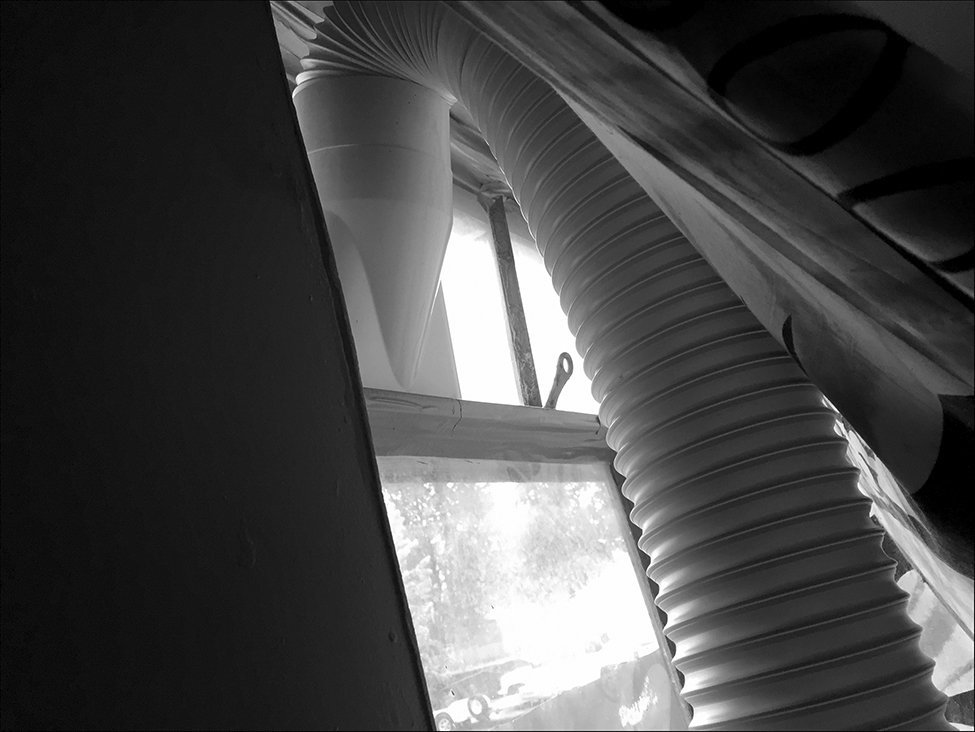
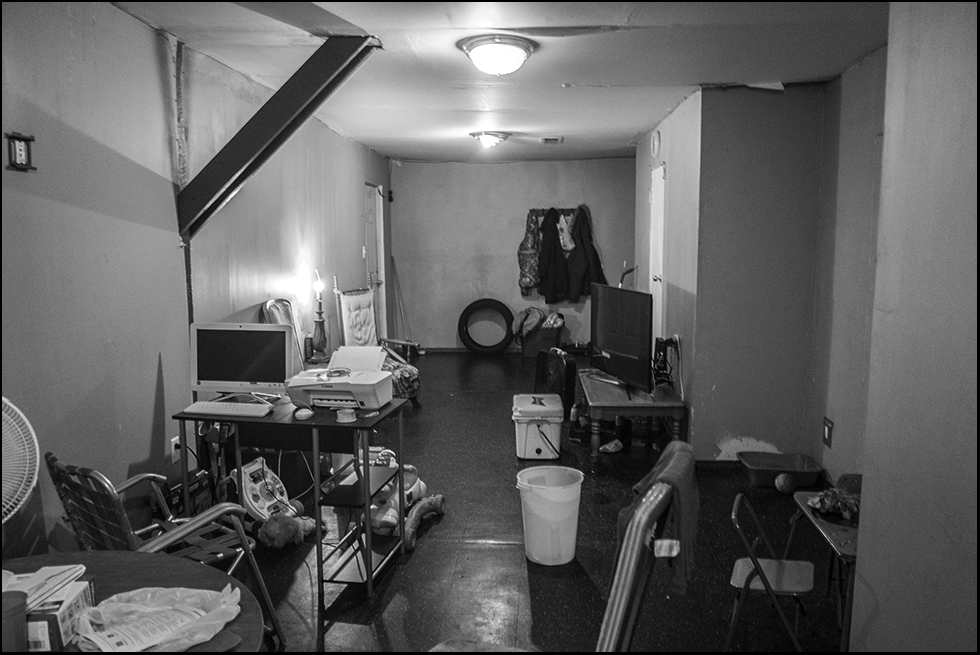
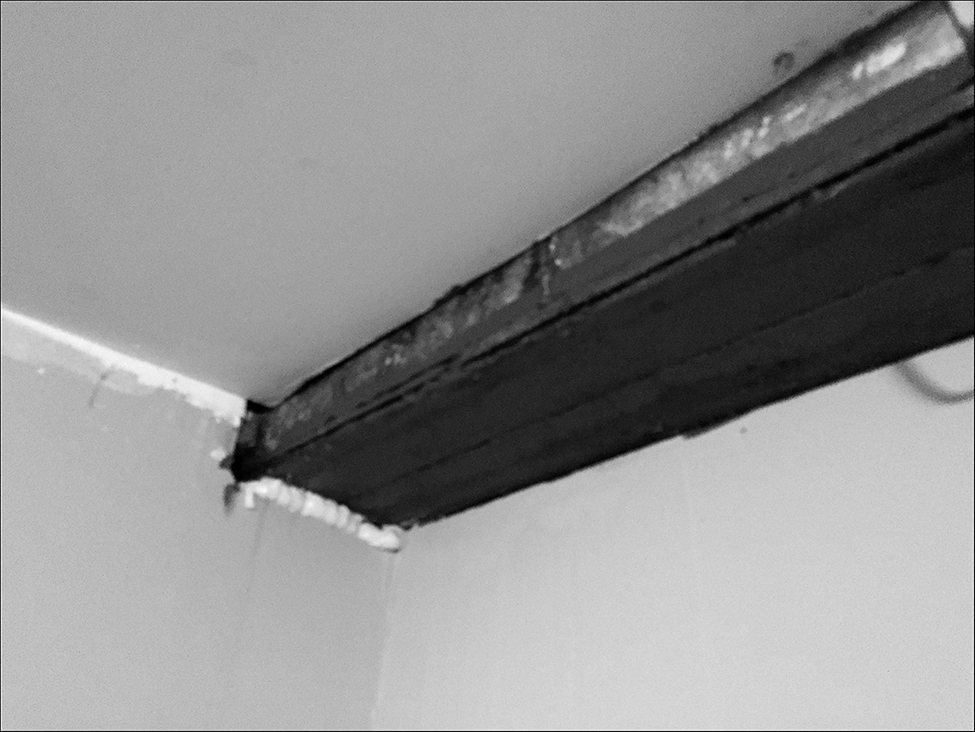
Photograph details: Ceiling leak in living room, living room ceiling at risk of falling in, bucket in use to capture rain water leaking from ceiling, large hole patching job not completed, no closet doors, although renter says landlord promised doors. No ceiling above the closet. The hole goes directly to the attic crawl space, which haunts renter, because she constantly fears her cats may get lost in the attic. Large sheet rock panel that fell, yet the landlord hasn't repaired it. Shower curtain rods won't remain in place. Extension cords all over the kitchen floor to reach an outlet that works without tripping a breaker due to electrical overload. Where the living room walls meet the ceiling, poor repairs. Overview of living room. Leak in a bedroom. No closet doors her, although renters says landlord promised doors. More ceiling leaking issues. Portable AC unit. Renter says landlord says it is all that is required to cool the 3 bedroom apartment. Renter says the unit only cools one bedroom. AC unit exhaust hose threaded out of renter's daughter's bedroom. Extension cords strung across the apartment because many of the existing outlets won’t handle the proper electrical load, which is a classic fire hazard.
"It's got me to where I'm scared, I'm frightened, I'm overwhelmed. I'm scared for my kids. Its not safe anymore."
She has been struggling to keep her family safe, while living in a duplex that's in disrepair. Despite repeated requests for years, her landlord hasn't made the substantial repairs to the duplex. She says 6 months ago she began telling the landlord about the dangerous upstairs floor. "It's been about six months and now every month I would tell him, or every day I would text him. I'd tell him about that floor is getting weaker and weaker. The board keeps coming up. Every time you step on it, it's gonna go through. And tonight, my second oldest daughter was helping me try to get a mattress downstairs. She stepped on that one board. It flew her right to the vent and her leg went right through the floor into the next floor below, and that is exactly where me and my 10-year-old and my three-year-old grandson, he'll hop in bed with me and he'll sleep there. So, it could have happened when we were sleeping.".
November 2018: A child sits on the bed where nails and splintered wood crashed down upon the spot he and his grandmother sleep, after his mother fell through the ceiling, above. The tenat said she’s been asking her landlord to repair the dangerous upstairs floor for 6 months, but he didn’t do the repairs and her daughter fell through the ceiling, escaping serious injury, or death. “It's got me to where I'm scared, I'm frightened, I'm overwhelmed. I'm scared for my kids. Its not safe anymore. So, I just need to be done. My anxiety is through the roof. It's through the roof. The room looks like it's just like somebody dropped a bombshell and the whole thing came down. I can’t imagine if I was sleeping and waking up to that hitting you, and ... No, I just thank God that it wasn't at night.
“... If that would have happened when we were asleep and I don’t know what else coulda happened, whatever went wrong, it could have really killed one of us. And when Courtney went through, it could have killed her.”
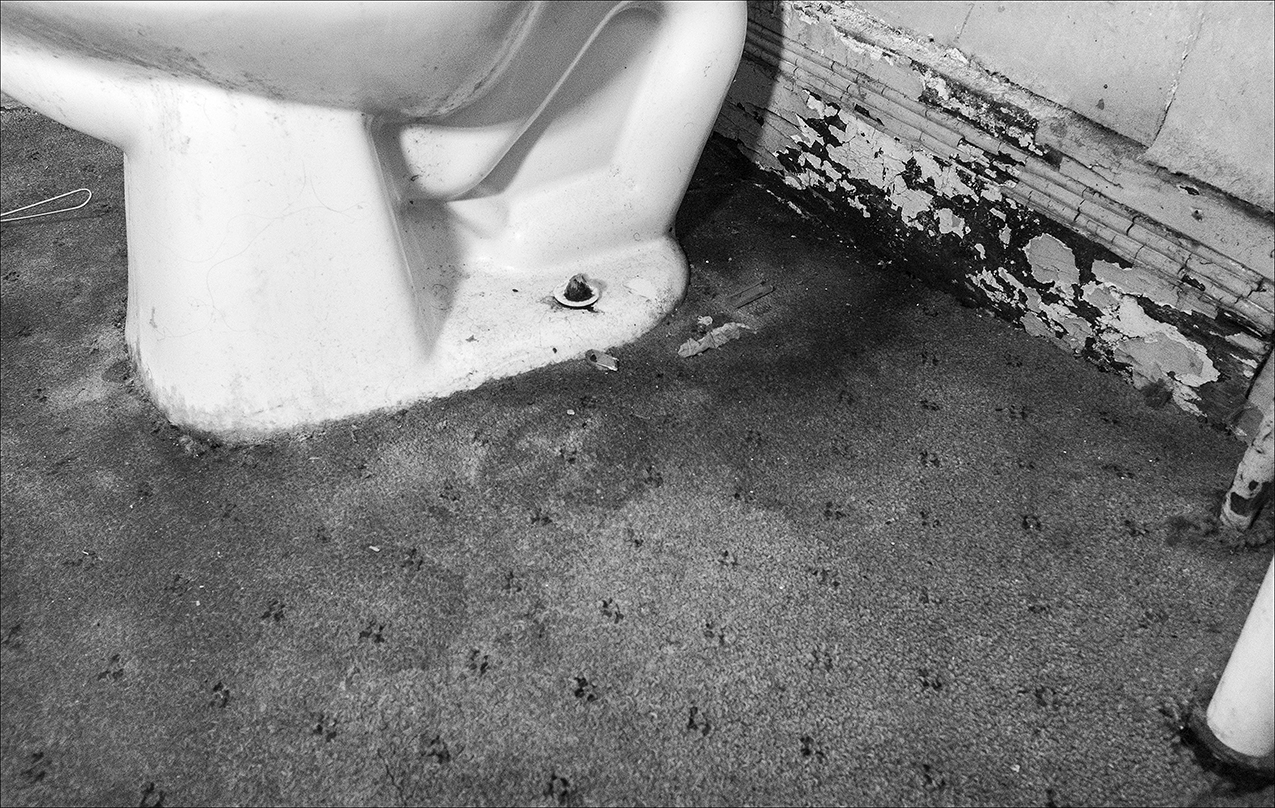
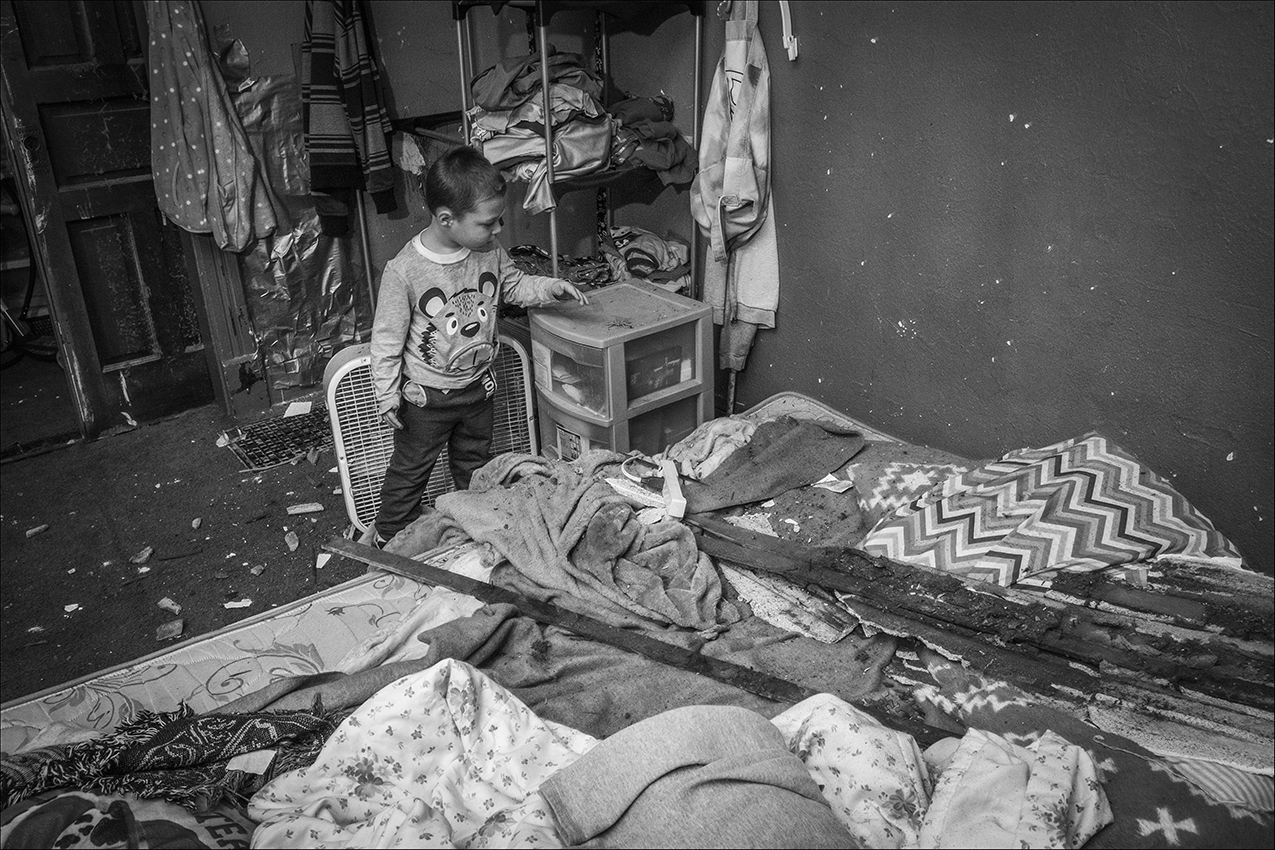
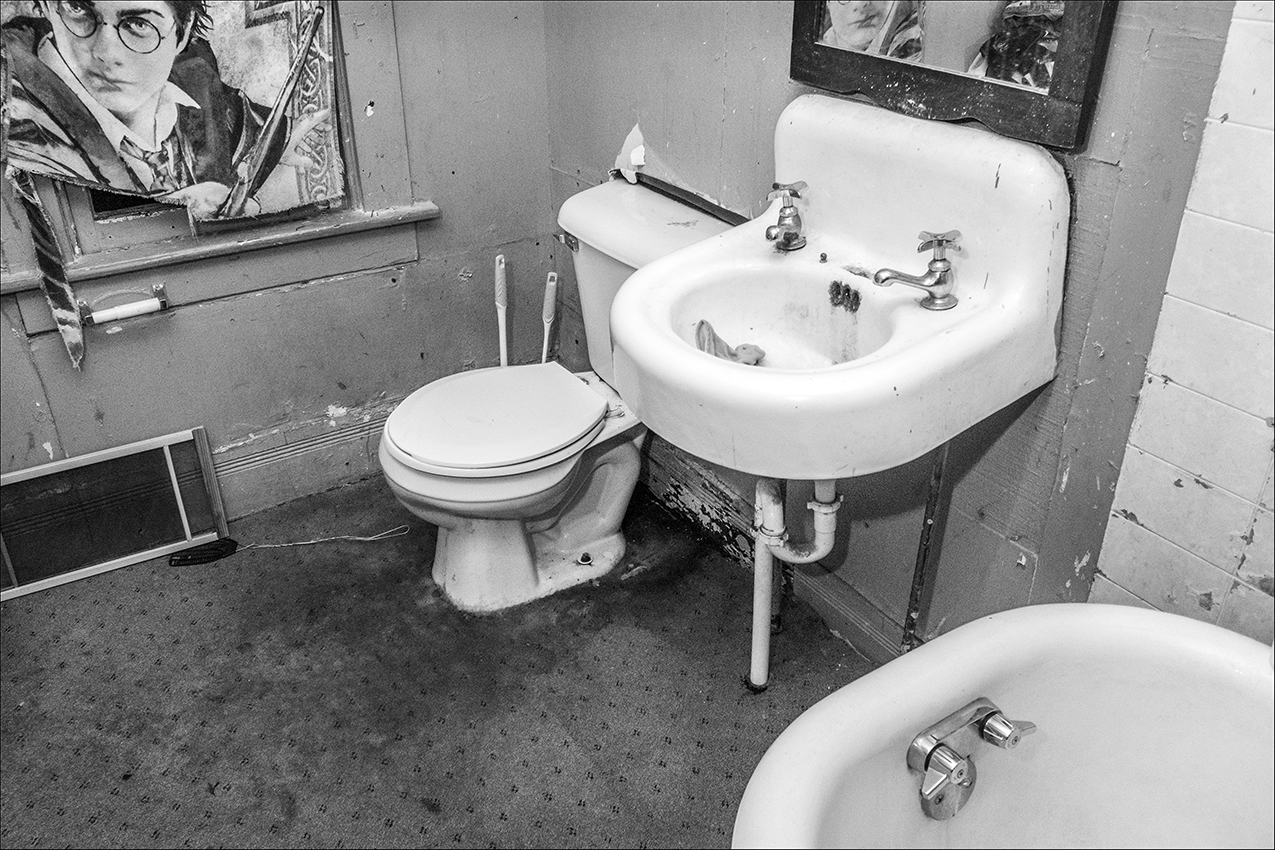

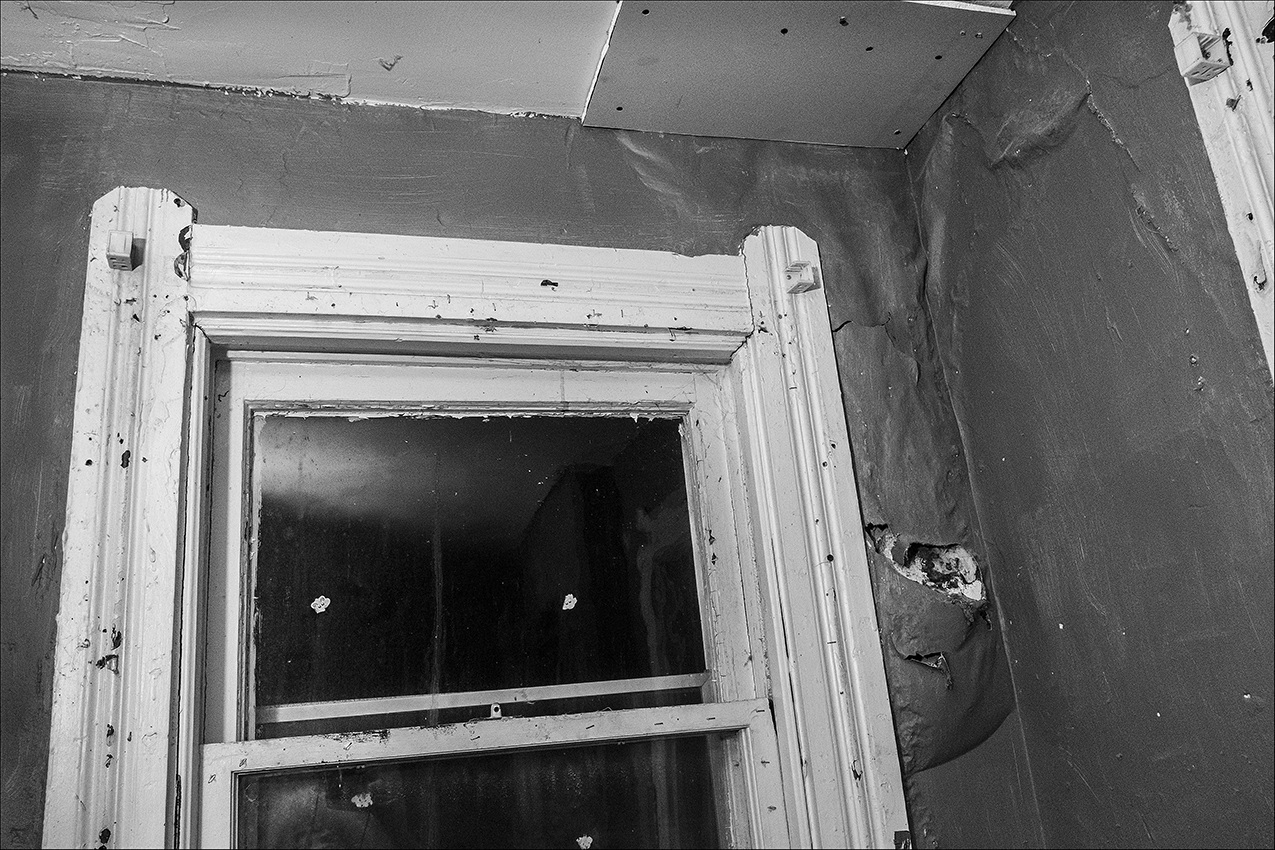
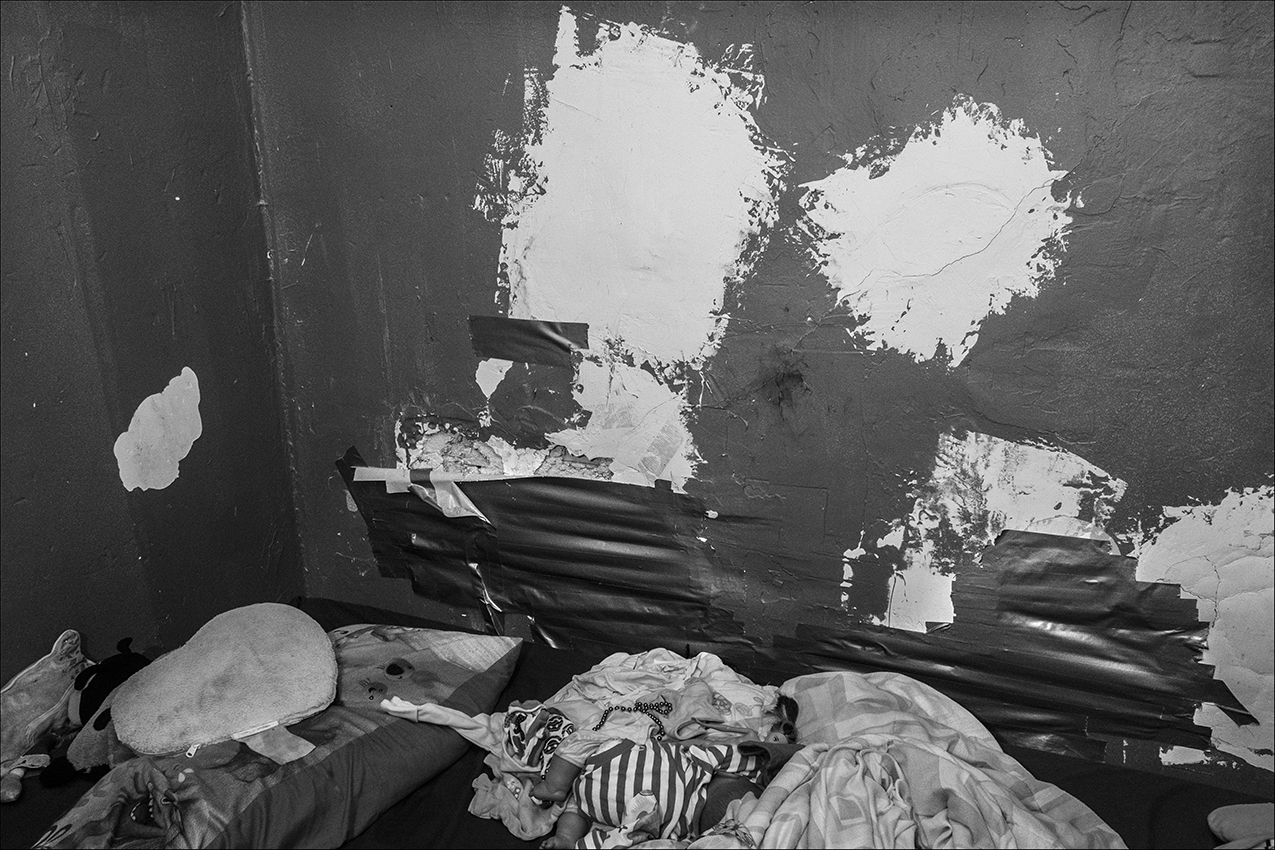
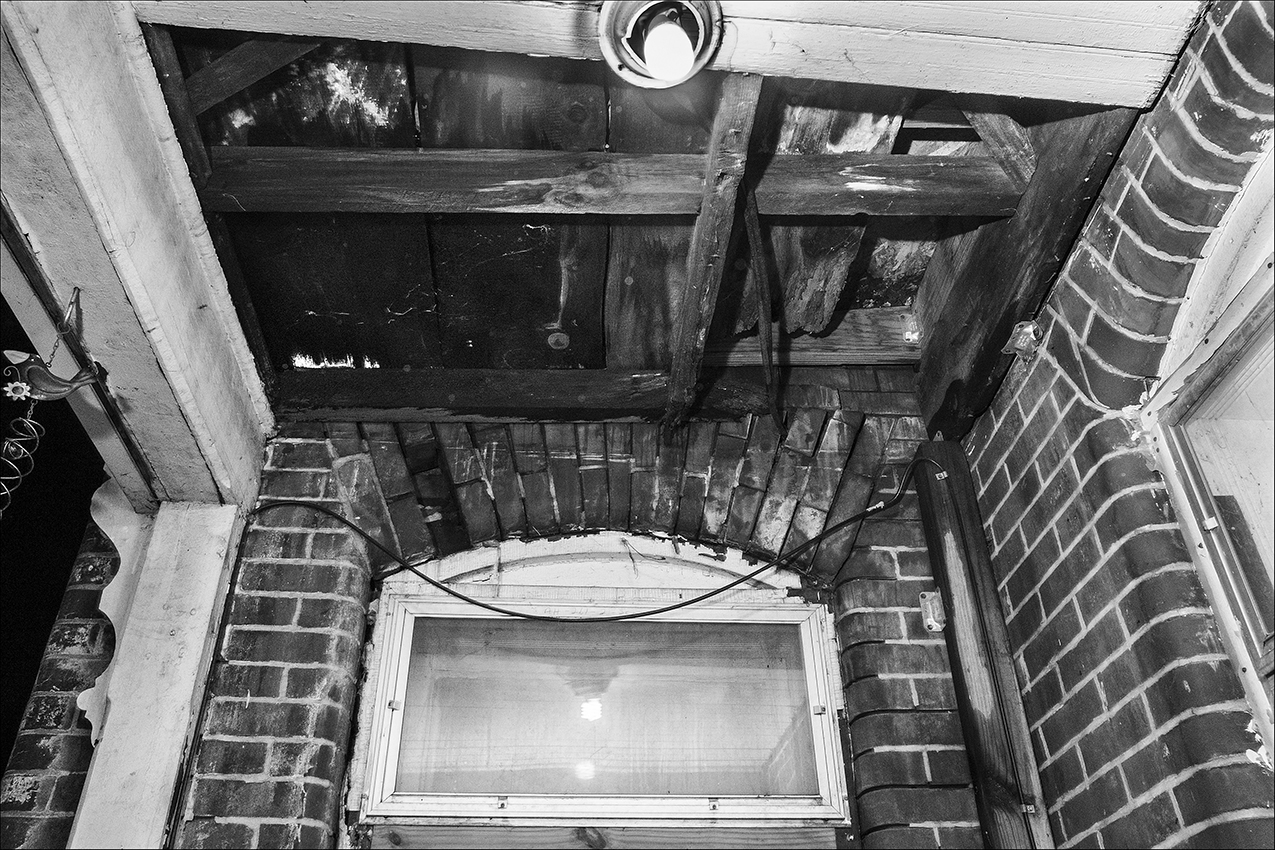

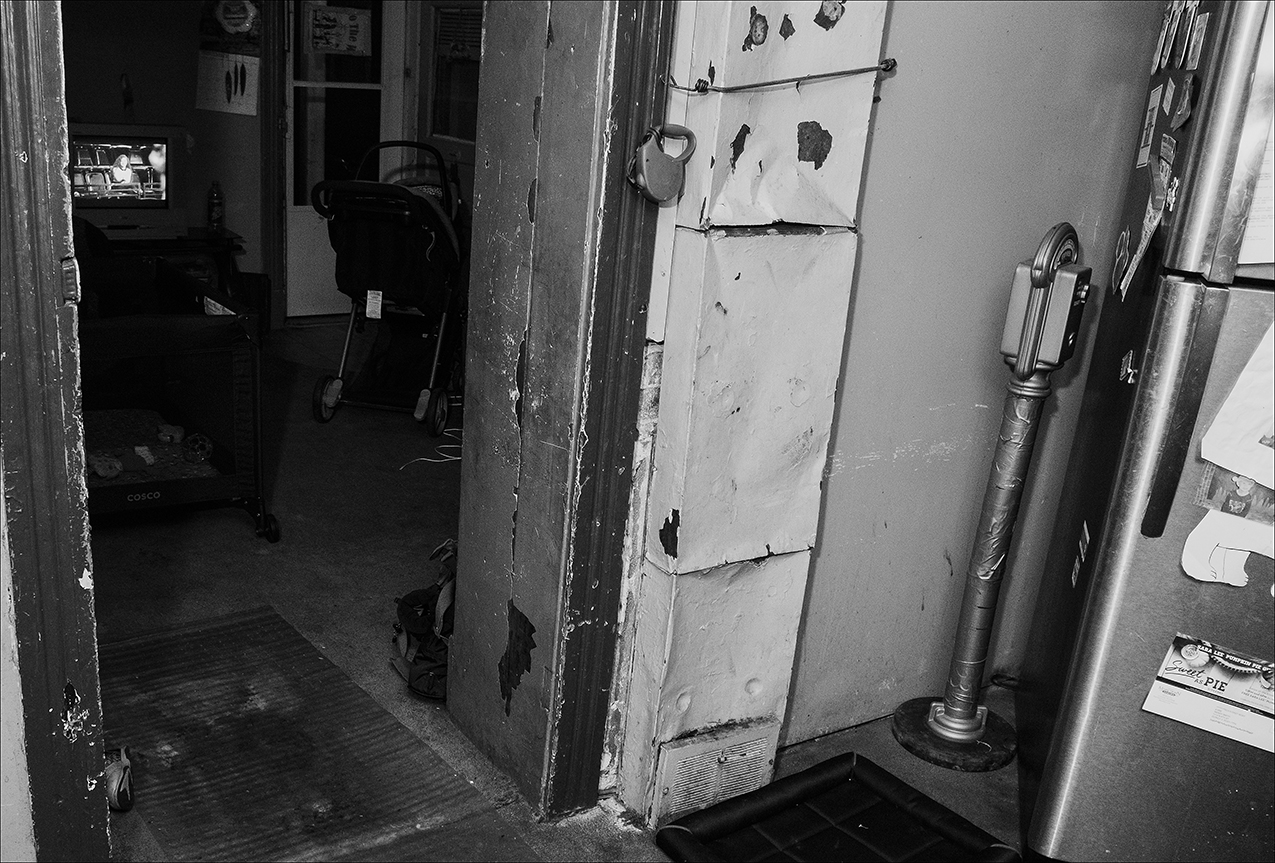
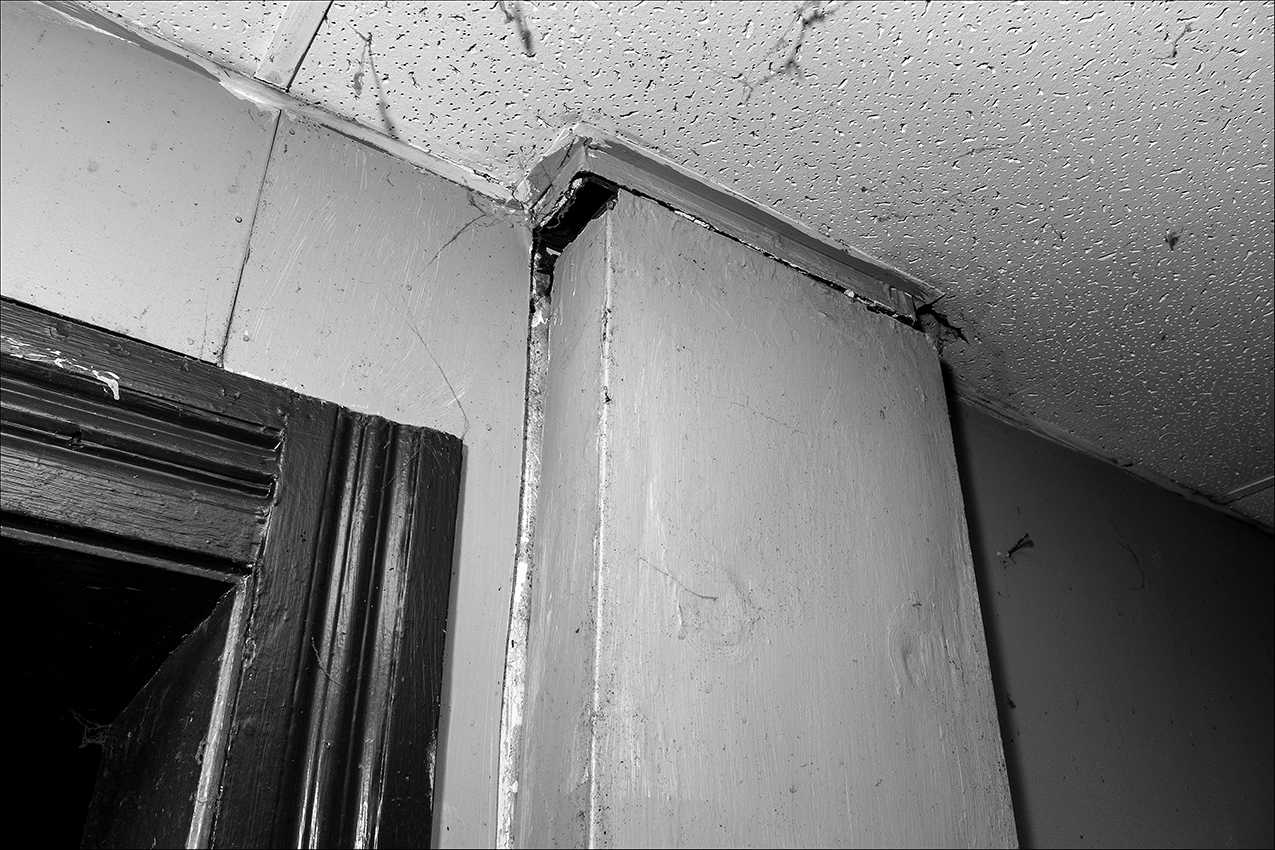
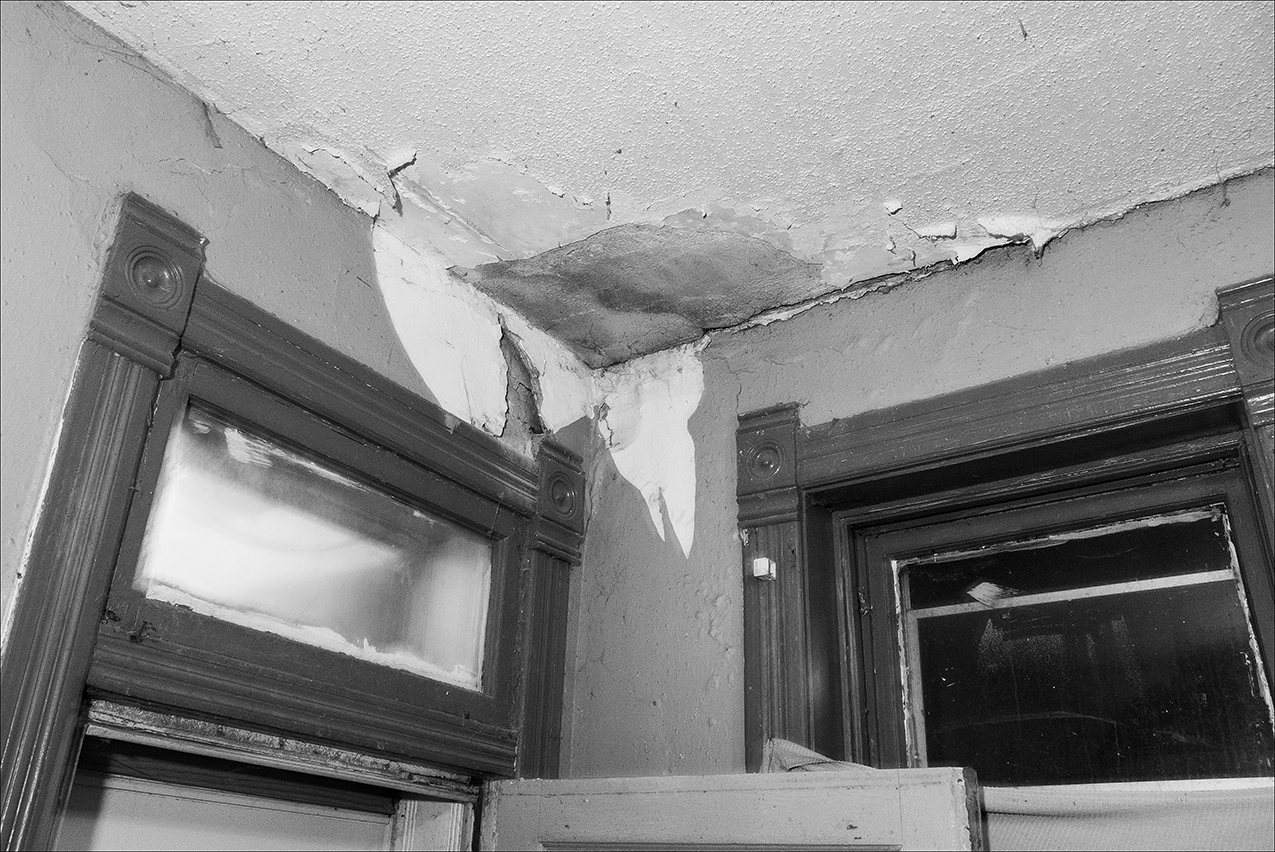
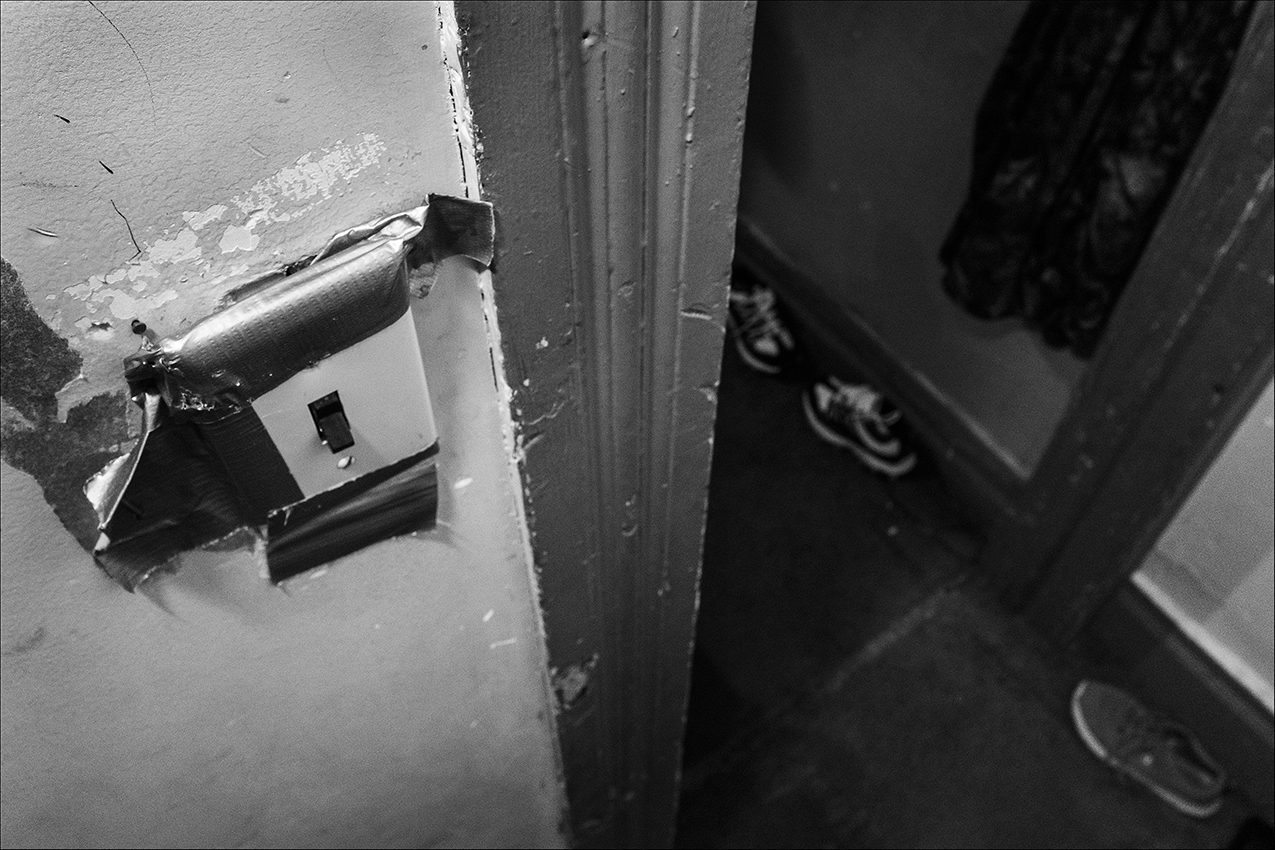
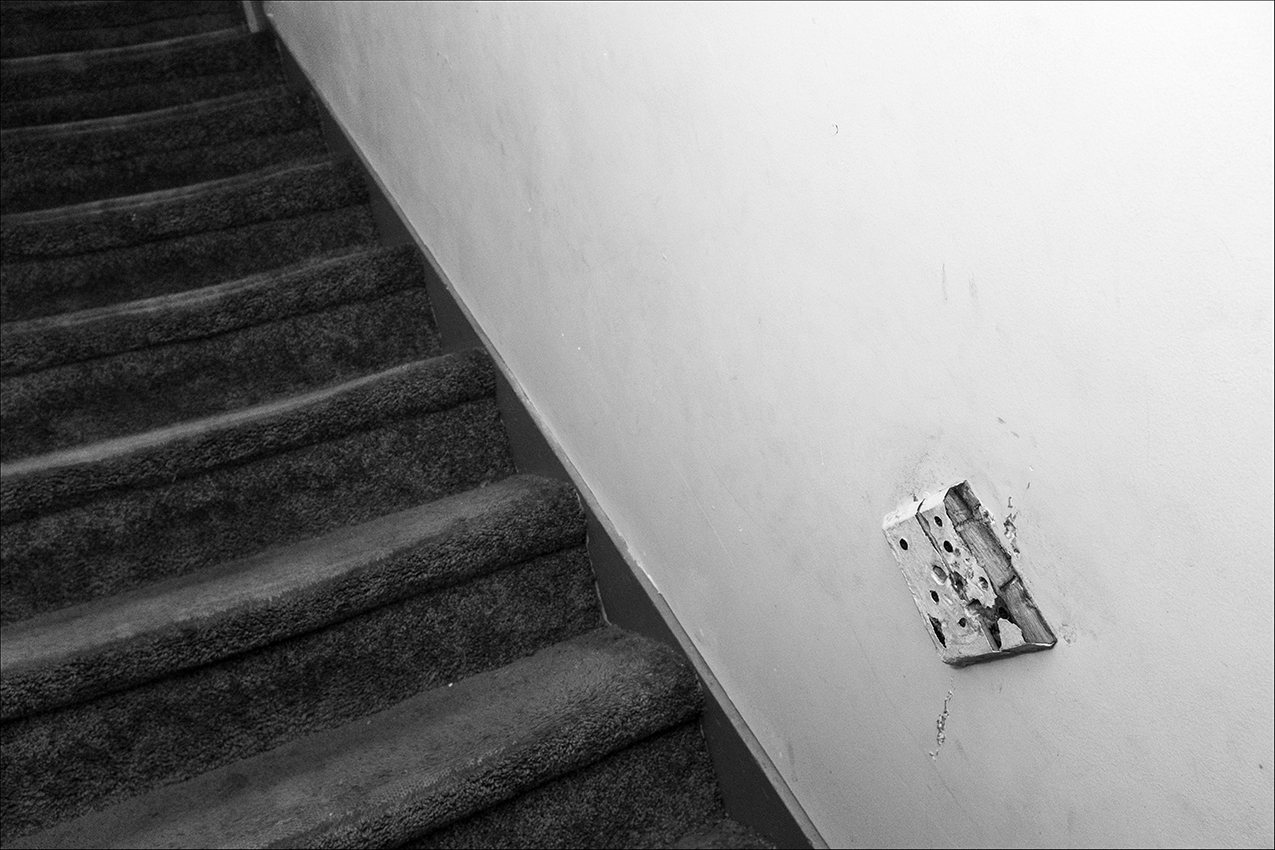
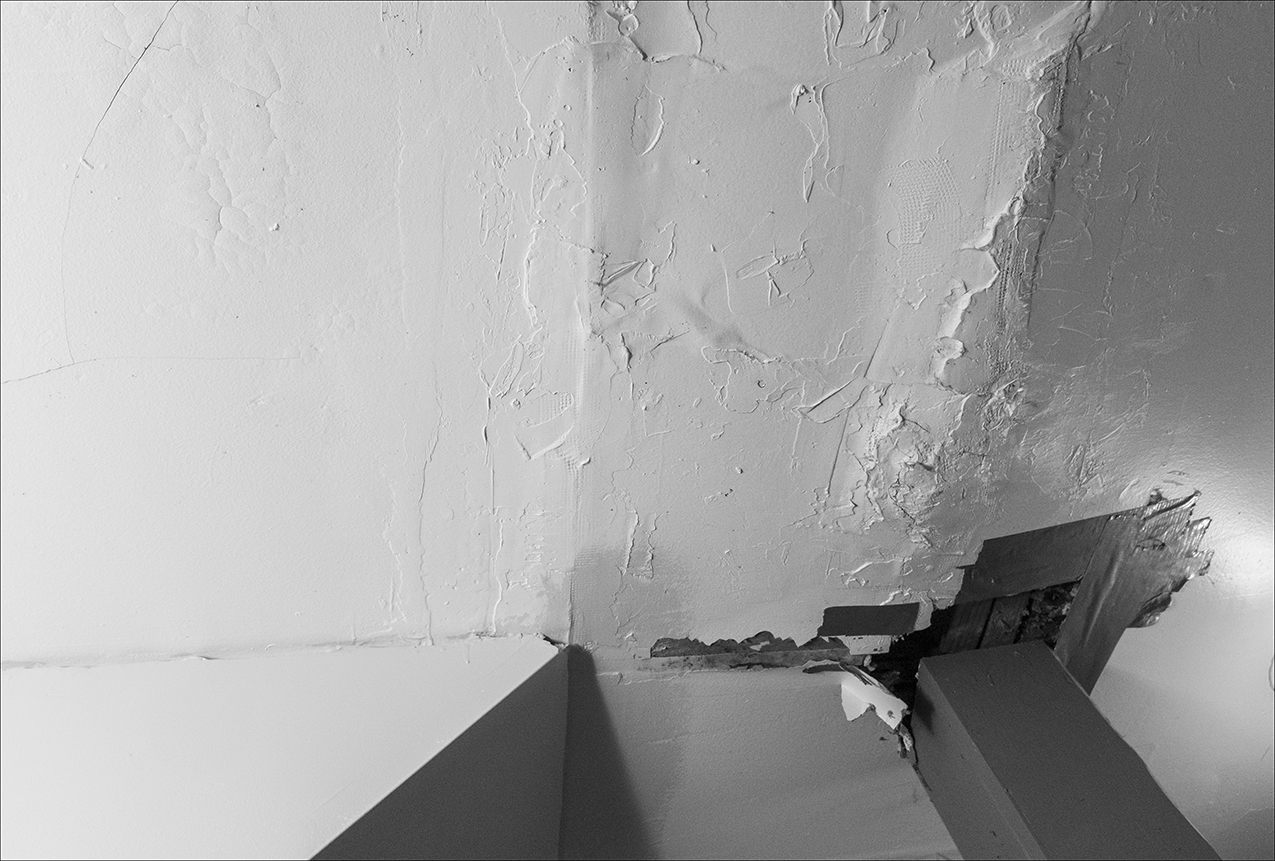
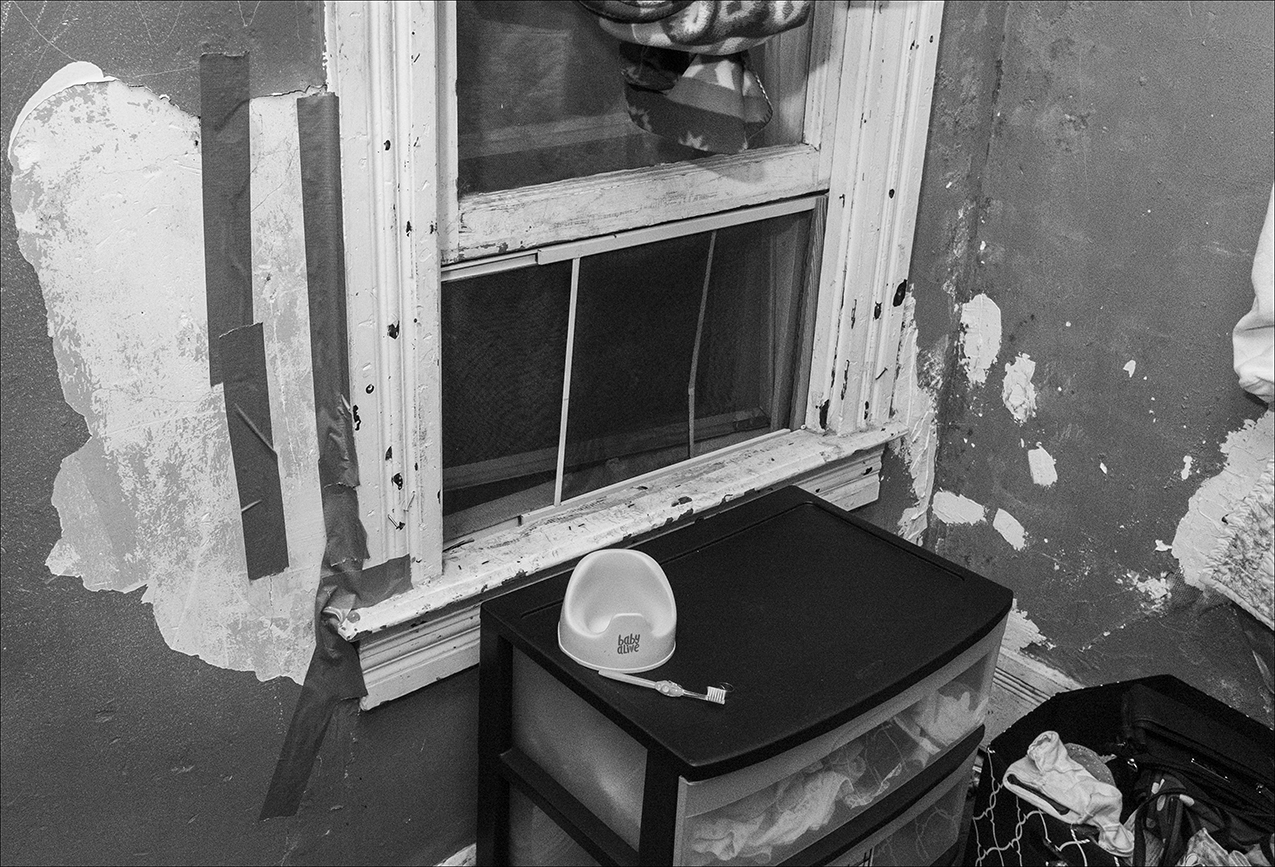
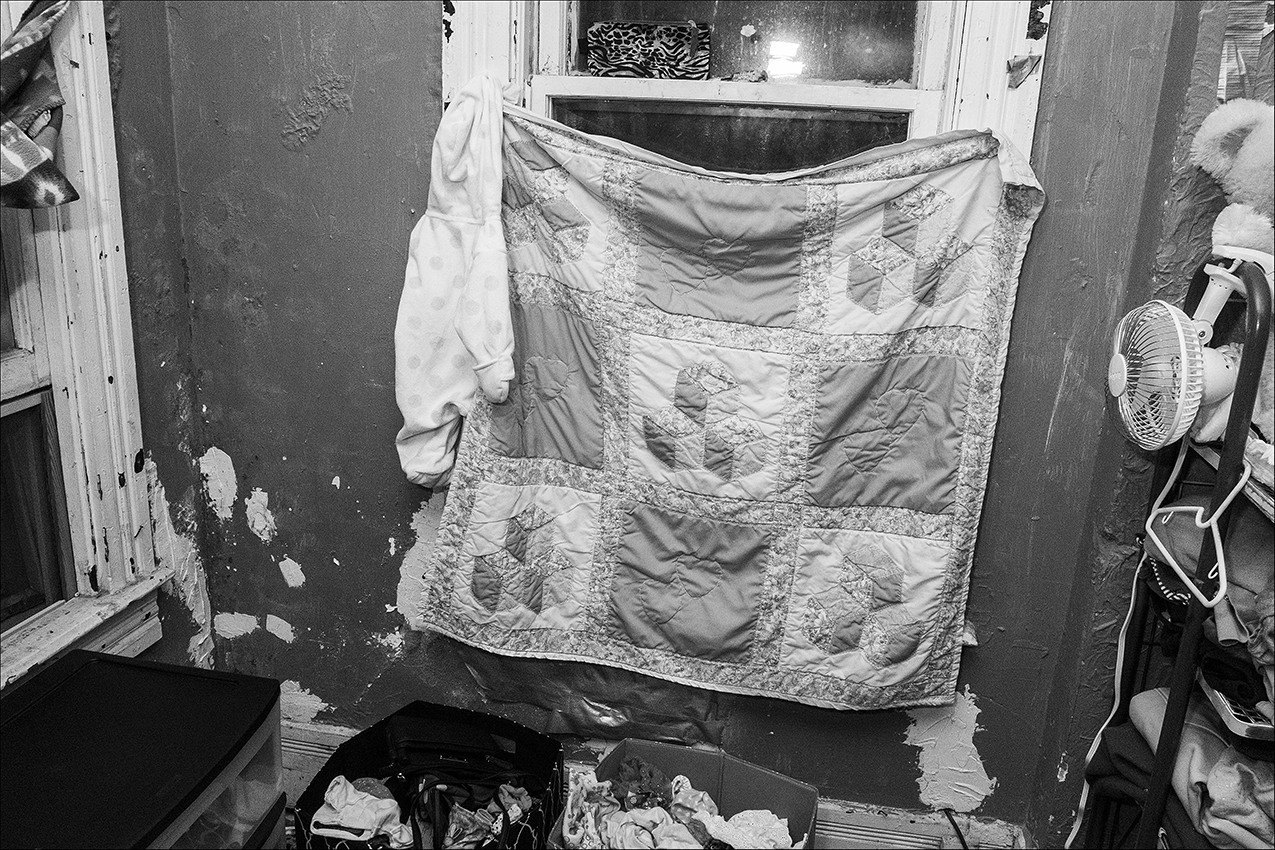
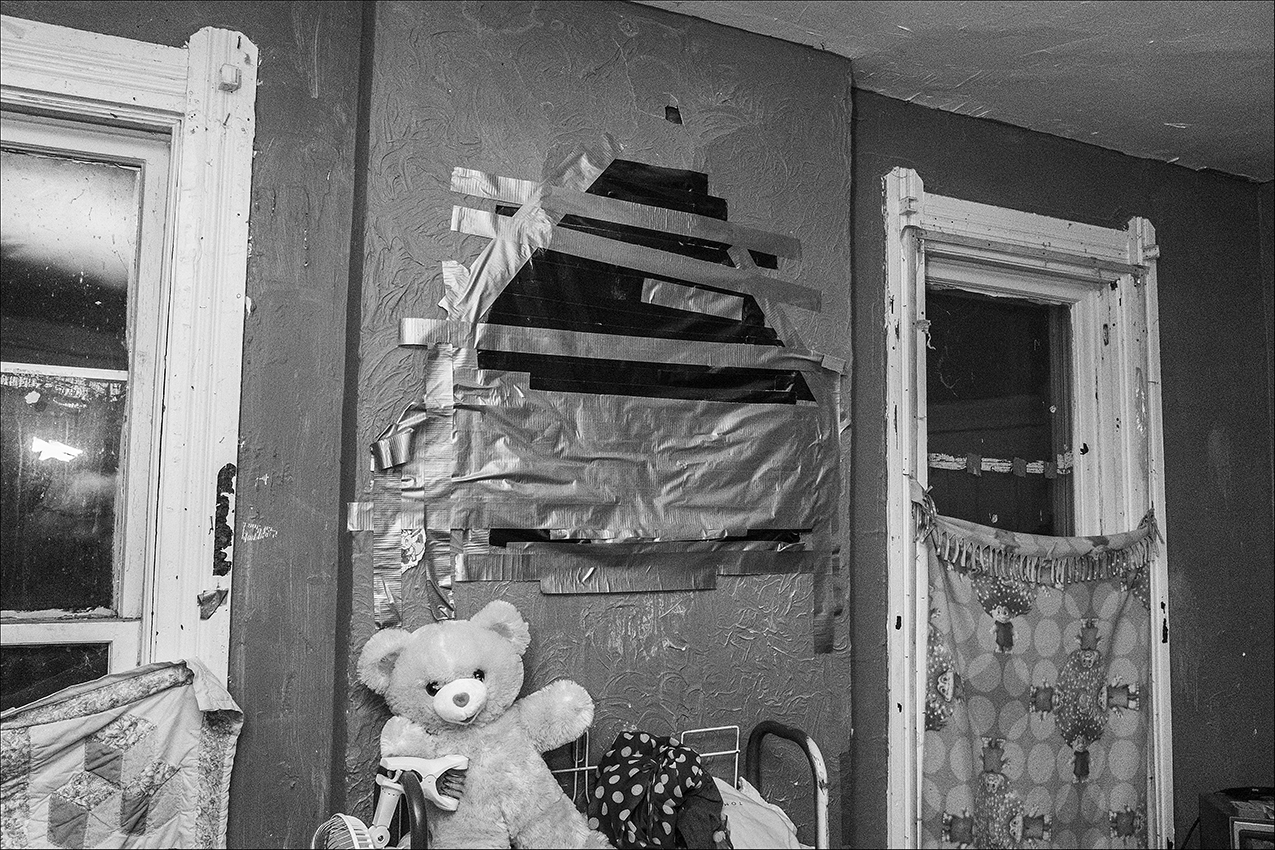
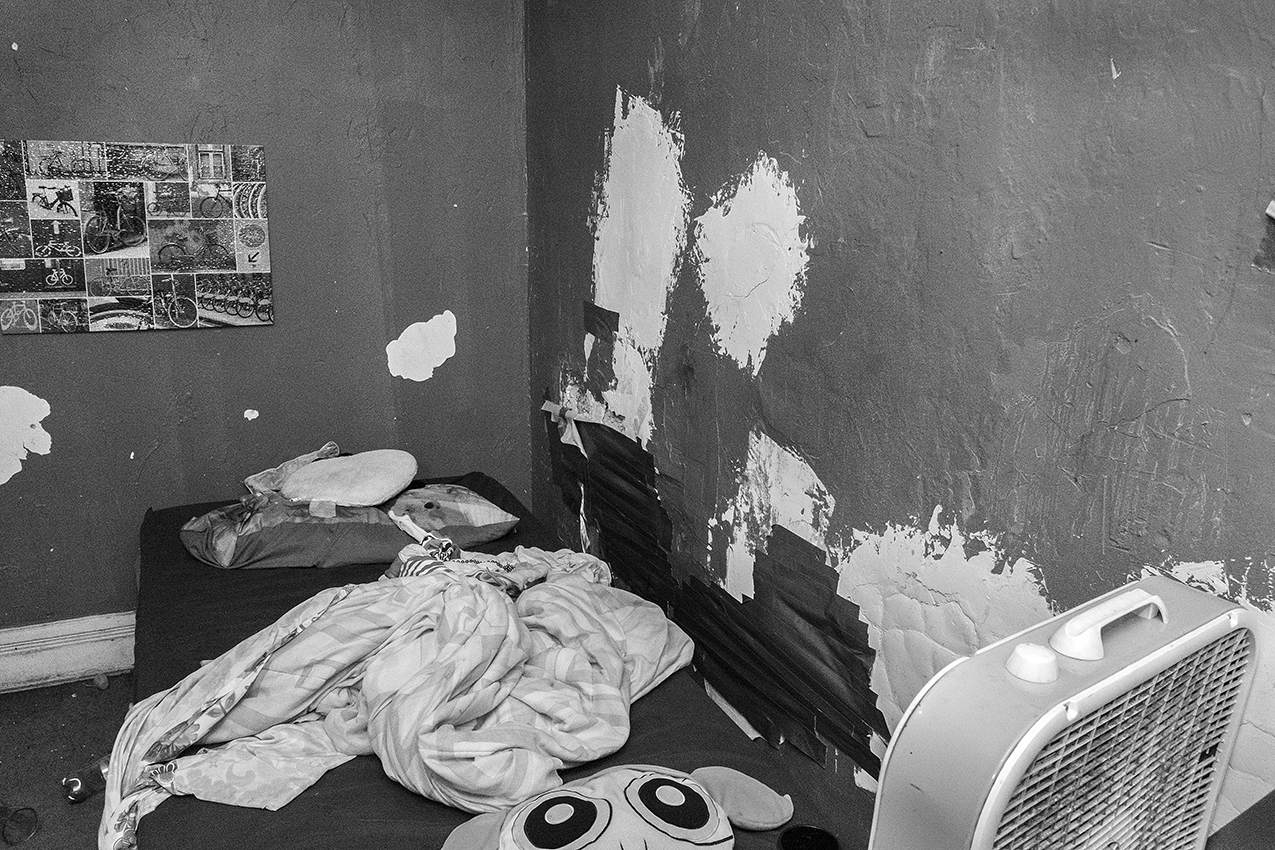
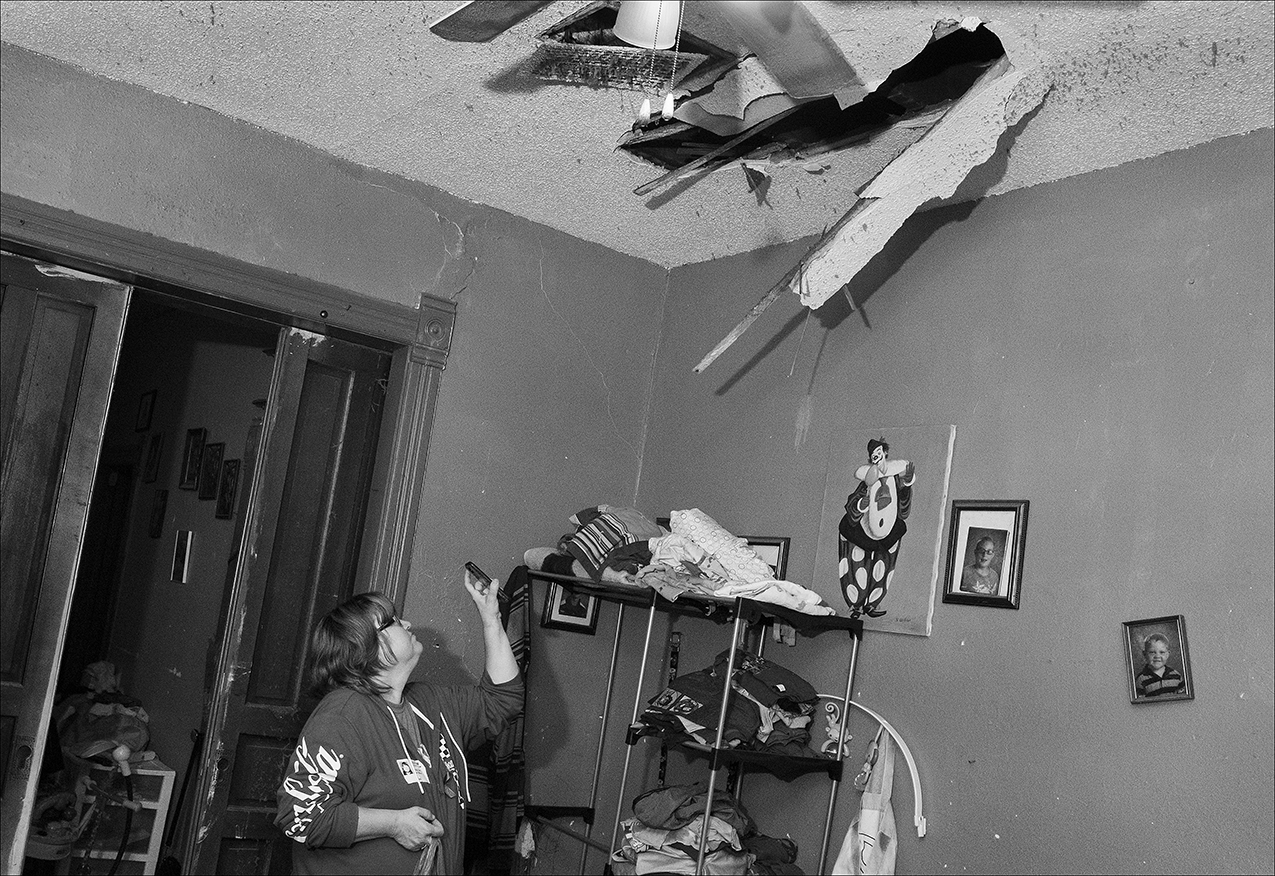
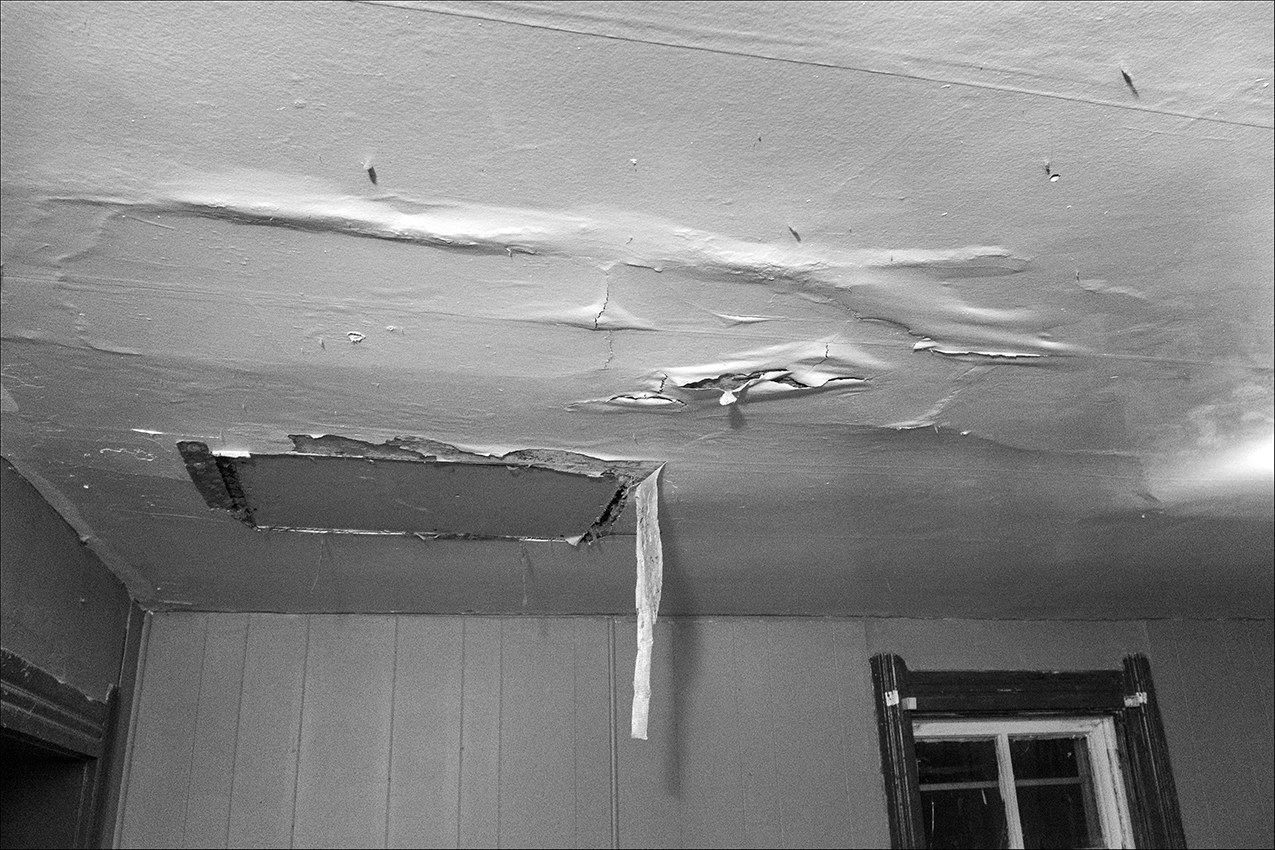
The photographs above detail some of the major repair issues the tenat says her landlord hasn’t addressed in the nearly 2 years he has owned the property. The Quincy Illinois Poverty Project has documented this tenant’s situation for more than a year and a half.
"Nothing's getting done, and you just keep telling them and keep telling them and they just put it off. All they want is the rent. They don't wanna be there for their tenants. And then they laughed. They don't care. They just asked if we had somewhere to go. They didn't even wanna put us nowhere. I asked them if they could put us up in a hotel. No, just out of the room. That's all he says "Stay out of this room."
Terrorized by his landlord’s son, Walter lives in the yard of the house in Quincy, he rents for $400 a month. The rental house is supposed to have electricity and heat, but the landlord’s son destroyed the meter box and never replaced it as promised. There are far too many people like Walter being victimized by criminal-minded landlords in Quincy. See Walters story https://www.quincyilpovertyproject.org/walter
July 2017: Walter, 74, cooks his dinner of rice on an open fire in the yard of the house he is renting for $400 a month. The landlord had promised the meter box housing would be replaced upon move in, but that didn’t take place. Walter, living without electricity, or gas, must cook on an open fire outdoors. This situation lasted through the entire winter.
December 2017: Walter carries a bag of dog food, donated by a local good Samaritan, from his backyard shelter to the house he rents, which still has no electricity or heat. He says he must put the dog food in the refrigerator, which doesn’t work, to keep mice and rats from getting into it. Now five months later, the utilities meter is still not replaced so Walter use his open fireplace to keep warm and cook meals from canned food the receives at local food pantries. Freezing weather takes its toll, however. Walter spends many evenings in fast-food restaurants to stay warm and a friend allows him to stop by and take a shower every couple of weeks.


